#<- tagging as a matter of format
Explore tagged Tumblr posts
Text

Reader's Interpretation
#omniscient reader's viewpoint#orv#kim dokja#yoo joonghyuk#joongdok#<- tagging as a matter of format#the oldest dream#god do i have to like. spoiler tag now#orv spoilers#to be safe#art i made#this is sort of a companion to my lasts death of the author yoohan so yes theres gonna be one more for doksoo#genuinely this took me so long to figure out like odyjh + reader's interpretation as the prompt#bc like peak odyjh to me will always be that one official print from the taiwan publisher of od sleeping on a pile of yjh's bones#like i cant do better than that. what the hell#havent checked the replay yet but i feel like half the time spent rendering this thing went into that picture frame. christ alive
73 notes
·
View notes
Text


[Congratulations, congratulations, congratulations.]
#Isat#sasasap#sasasaap spoilers#sasasaap siffrin#isat siffrin#isat loop#isat spoilers#two hats spoilers#in stars and time#HEEEYYYYYYYY YALLLLL.....#This is a lot bigger than I thought it would be but lmao here you go <3#sorry for how big it is I dont. know how to format this Tumblr wise???#I dont usually do big ass projects like this and then post them#Also if you get the reference youre fucking awesome as hell btw#despite both mira and Isa in frame.. I am not fucking tagging them <3#this is all about them but they are also not part of this so lol sorrryyyyy#also i made a slight mistake but you dont fucking see it so thats all that matters to me#(several mistakes Im ignoring because this took fucking DAYS)#Anyway hope this doesnt take over the dash my apologies ahead of time if it does </3
639 notes
·
View notes
Text
ACTUALLY speaking of the intricacies of rodimus story and character. i need to make you all eat cardboard w me.
i was thinking the other day abt how the main thing that defines rodimus all the way throughout mtmte/ll is how he is always so overwhelmingly ready to give someone a second chance. he introduces the reintegration act for drift. he lets cyclonus be a part of his crew even though its strongly advised against. when he cures the members of his crew who mutinied from being sparkeaters he says "obviously youre forgiven". megatron, scourge of the fucking galaxy, is given another chance to be good under rodimus' watch. he even spares fucking getaway, in a moment that literally REVEALS his TRUE COLORS
and i was thinking about how like. of course he would do that. he was given a second chance himself. the matrix saved his life, the most important spiritual artifact his race has, and he was a nobody from a poor town so awful it was a breeding ground for decepticon sentiment, and he had to destroy that town with his own two hands and charges he rigged. its no wonder he thinks everyone must deserve it, a second chance to be better than they were.
its also no wonder he feels like he has to prove himself or live up to some mythical idea of what a prime is or he doesnt deserve it, doesnt deserve the chance he was given. and man. i literally just want to tell him that hes so . he doesnt have to be optimus or anyone else . hes his best when hes himself because who he is is so genuinely good and warm and fun and the crew he has couldnt have come together as a family being led by anyone else. and it makes his "you may not be good but you are good enough" speech that ties together the whole comic so well even more resonant bc he is also saying this about himself. his arc is about realizing that hes good enough. sobbing on the floor
#💖🔥#idw rodimus#mtmte spoilers#ll spoilers#does it matter to tag those. idk#but like. god. i love him#and this doesnt even bring up how his obvious adhd works into all this !!!!!!!!!!!!!!!!! augh i could be here forever#if this is formatted weird its bc its stuff ive said on discord that i pasted here bc its still on my mind. all the time
610 notes
·
View notes
Text
Double Indemnity, Veritas Ratio and Aventurine

This was originally a part of my compilation post as a short analysis on the Double Indemnity references, linking to this great thread by Manya on Twitter. However, I've recently watched the movie and found that the parallels run much deeper than just the mission name and the light cone itself, plus as the short synopsis I've read online. Since there isn't really an in-depth attempt at an analysis on the film in relation to the way Aventurine and Ratio present themselves throughout Penacony, I thought I'd take a stab at doing just that. I will also be bringing up things from Manya's thread as well as another thread that has some extra points.
Disclaimer that I... don't do analyses very often. Or write, in general — I'm someone who likes to illustrate their thoughts (in the artistic sense) more than write. There's just something about these two that makes me want to rip into them so badly, so here we are. If there's anything you'd like to add or correct me on, feel free to let me know in the replies or reblogs, or asks. This ended up being a rather extensive deep dive into the movie and its influences on the pairing, so please keep that in mind when pressing Read More.
There are two distinct layers on display in Ratio and Aventurine's relationship throughout Penacony, which are references to the two most important relationships in the movie — where they act like they hate/don’t know each other, and where they trust each other.
SPOILER WARNING for the entire movie, by the way. You can watch the film for free here on archive.org, as well as follow along with the screenplay here. I will also be taking dialogue and such from the screenplay, and cite quotes from the original novel in its own dedicated section. SPOILER WARNING for the Cat Among Pigeons Trailblaze mission, as well.

CONTENT WARNING FOR MENTIONS OF SUICIDE. YOU HAVE BEEN WARNED.
To start, Double Indemnity (1944) is a film noir by Billy Wilder (and co-written by Raymond Chandler) based on the novel of the same name by James M. Cain (1927). There are stark differences between the movie adaptation and the original novel which I will get into later on in this post, albeit in a smaller section, as this analysis is mainly focused on the movie adaptation. I will talk about the basics (summaries for the movie and the game, specifically the Penacony mission in tandem with Ratio and Aventurine) before diving into the character and scene parallels, among other things.

—
[THE NAME]
The term "double indemnity" is a clause in which if there’s a case of accidental death of a statistically rare variety, the insurance company has to pay out multiple of the original amount. This excludes deaths by murder, suicide, gross negligence, and natural causes.

The part of the mission in Cat Among Pigeons where Ratio and Aventurine meet with Sunday is named after the movie. And before we get further into things, let's get this part out of the way: The Chinese name used in the mission is the CN title of the movie, so there's no liberties taken with the localization — this makes it clear that it’s a nod to the movie and not localization doing its own thing like with the mission name for Heaven Is A Place On Earth (EN) / This Side of Paradise (人间天堂) (CN).

—
[SUMMARY OF THE 1944 MOVIE]
Here I summarised the important parts that will eventually be relevant in the analysis related to the game.

Insurance salesman Walter Neff, wounded from a gunshot, enters his office and confesses his crime on a dictaphone to his boss Barton Keyes, the claims manager. Much earlier, he had met Phyllis Dietrichson, the wife of Mr. Dietrichson and former nurse. Neff had initially wanted to meet Mr. Dietrichson because of car insurance. Phyllis claims her husband is mean to her and that his life insurance goes to his daughter Lola. With Neff seduced by Phyllis, they eventually brew up a scheme to murder Mr. Dietrichson in such a way that they activate the "double indemnity" clause, and the plan goes off almost perfectly. Initially, the death is labeled a suicide by the president of the company, Norton.
Keyes finds the whole situation suspicious, and starts to suspect Phyllis may have had an accomplice. The label on the death goes from accidental, to suicide, to then murder. When it’s ruled that the husband had no idea of the accidental policy, the company refuses to pay. Neff befriends Phyllis’ stepdaughter Lola, and after finding out Phyllis may have played a part in the death of her father’s previous wife, Neff begins to fear for Lola and himself, as the life insurance would go all towards her, not Phyllis.
After the plan begins to unravel as a witness is found, it comes out that Lola’s boyfriend Nino Zachette has been visiting Phyllis every night after the murder. Neff goes to confront Phyllis, intending to kill her. Phyllis has her own plans, and ends up shooting him, but is unable to fire any more shots once she realises she did love him. Neff kills her in two shots. Soon after telling Zachette not to go inside the house, Neff drives to his office to record the confession. When Keyes arrives, Neff tells him he will go to Mexico, but he collapses before he could get out of the building.
—
[THE PENACONY MISSION TIMELINE]

I won’t be summarising the entirety of Aventurine and Ratio’s endeavours from the beginning of their relationship to their final conversation in Heaven Is A Place On Earth the same way as I summarised the plot of the movie, so I will instead present a timeline. Bolded parts means they are important and have clear parallels, and texts that are in [brackets] and italics stand for the names of either the light cone, or the mission names.
[Final Victor] Their first meeting. Ratio’s ideals are turned on its head as he finally meets his match.
Several missions happen in-between their first encounter and the Penacony project. They come to grow so close and trusting with each other that they can guess, understand each other’s thoughts, way of thinking and minds even in high stakes missions. Enough to pull off the Prisoner’s Dilemma (Aventurine’s E1) and Stag Hunt Game (Aventurine’s E6) and come out on top.
Aventurine turns towards Ratio for assisting him in the Penacony project. Ratio's involvement in the project is implied to be done without the knowledge of Jade, Topaz, and the IPC in general, as he was only sent to Penacony to represent the Intelligentsia Guild, and the two other Stonehearts never mention Ratio.
Aventurine and Ratio cook up the plan to deceive Sunday before ever setting foot on Penacony. Aventurine does not tell Ratio the entirety of his plan.
Aventurine convinces Topaz and Jade to trust him with their Cornerstones. Aventurine also breaks his own Cornerstone and hides it along with the jade within a bag of gift money.
[The Youth Who Chase Dreams] They enter Penacony in the Reverie Hotel. Aventurine is taken to the side by Sunday and has all his valuables taken, which includes the gift money that contains the broken aventurine stone, the jade, and the case containing the topaz.
Aventurine and Ratio speak in a “private” room about how Aventurine messed up the plan. After faking an argument to the all-seeing eyes of Sunday, Ratio leaves in a huff.
Ratio, wearing his alabaster head, is seen around Golden Hour in the (Dusk) Auction House by March 7th.
[Double Indemnity] Ratio meets up with Sunday and “exposes” Aventurine to him. Sunday buys his “betrayal”, and is now in possession of the topaz and jade. Note that this is in truth Ratio betraying Sunday all along.
Ratio meets up with Aventurine again at the bar. Ratio tells Aventurine Sunday wants to see him again.
They go to Dewlight Pavilion and solve a bunch of puzzles to prove their worth to Sunday.
They meet up with Sunday. Sunday forces Aventurine to tell the truth using his Harmony powers. Ratio cannot watch on. It ends with Aventurine taking the gift money with his Cornerstone.
[Heaven Is A Place On Earth] They are in Golden Hour. Ratio tries to pry Aventurine about his plan, but Aventurine reins him in to stop breaking character. Ratio gives him the Mundanite’s Insight before leaving. This is their final conversation before Aventurine’s grandest death.
Now how exactly does the word “double indemnity” relate to their mission in-game? What is their payout? For the IPC, this would be Penacony itself — Aventurine, as the IPC ambassador, handing in the Jade Cornerstone as well as orchestrating a huge show for everybody to witness his death, means the IPC have a reason to reclaim the former prison frontier. As for Ratio, his payout would be information on Penacony’s Stellaron, although whether or not this was actually something he sought out is debatable. And Aventurine? It’s highly implied that he seeks an audience with Diamond, and breaking the Aventurine Cornerstone is a one way trip to getting into hot water with Diamond. With Aventurine’s self-destructive behaviour, however, it would also make sense to say that death would be his potential payout, had he taken that path in the realm of IX.
Compared to the movie, the timeline happens in reverse and opposite in some aspects. I will get into it later. As for the intended parallels, these are pretty clear and cut:
Veritas Ratio - Walter Neff
Aventurine - Phyllis Dietrichson
Sunday - Mr. Dietrichson

There is one other character who I feel also is represented in Ratio, but I won’t bring them up until later down the line.
For the sake of this analysis, I won’t be exploring Sunday’s parallel to Mr. Dietrichson, as there isn’t much on Dietrichson’s character in the first place in both the movie and the novel. He just kind of exists to be a bastard that is killed off at the halfway point. Plus, the analysis is specifically hyper focused on the other two.
—
[SO, WHAT’S THE PLAN?]
To make things less confusing in the long run whenever I mention the words “scheme” and “plan”, I will be going through the details of Phyllis and Neff’s scheme, and Aventurine and Ratio’s plan respectively. Anything that happens after either pair separate from another isn’t going to be included. Written in a way for the plans to have gone perfectly with no outside problems.

Phyllis and Neff —> Mr. Dietrichson
Goal: Activate the double indemnity clause by killing Mr. Dietrichson and making it look like a freak train accident
Payout: Twice or more of the face value of the life insurance ($100,000)
Main Actor: Walter Neff | Accomplice: Phyllis Dietrichson
During the entire time until the payout, Phyllis and Neff have to make sure to any outsiders that they look like complete strangers instead of lovers in an affair.
Step-by-step:
Neff convinces Mr. Dietrichson to sign the policy with the clause without him suspecting foul play, preferably with a third party to act as an alibi. This is done discreetly, making Mr. Dietrichson not read the policy closely and being told to just sign.
Neff and Phyllis talk to each other about small details through the phone (specified to be never at Phyllis’ own house and never when Neff was in his office) and in the marketplace only, to make their meetings look accidental. They shouldn’t be seen nor tracked together, after all.
Phyllis asks Mr. Dietrichson to take the train. She will be the one driving him to the train station.
On the night of the murder, after making sure his alibi is airtight, Neff sneaks into their residence and hides in their car in the second row seating, behind the front row passenger seat. He wears the same colour of clothes as Mr. Dietrichson.
Phyllis and Mr. Dietrichson get inside the car — Phyllis in the driver’s seat and Mr. Dietrichson in the passenger seat. Phyllis drives. On the way to the train station, she makes a detour into an alley. She honks the horn three times.
After the third honk, Neff breaks Mr. Dietrichson’s neck. The body is then hidden in the second row seating under a rug.
They drive to the train station. Phyllis helps Neff, now posing as Mr. Dietrichson, onto the train. The train leaves the station.
Neff makes it to the observation platform of the parlour car and drops onto the train tracks when nobody else is there.
Phyllis is at the dump beside the tracks. She makes the car blink twice as a signal.
The two drag Mr. Dietrichson’s corpse onto the tracks.
They leave.
When Phyllis eventually gets questioned by the insurance company, she pretends she has no idea what they are talking about and eventually storms off.
Phyllis and Neff continue to lay low until the insurance company pays out.
Profit!
Actual Result: The actual murder plan goes almost smoothly, with a bonus of Mr. Dietrichson having broken a leg. But with him not filing a claim for the broken leg, a witness at the observation platform, and Zachette visiting Phyllis every night after the murder, Keyes works out the murder scheme on his own, but pins the blame on Phyllis and Zachette, not Neff.

Now for Aventurine and Ratio. You can skip this section if you understand how deep their act goes, but to those who need a refresher, here’s a thorough explanation:
Aventurine and Ratio —> Sunday
Goal: Collect the aventurine stone without Sunday knowing, ruin the dream (and create the grandest death)
Payout: Penacony for the IPC, information on the Stellaron for Ratio, a meeting with Diamond / death for Aventurine
Main Actor: Aventurine | Accomplice: Veritas Ratio
From the moment they step onto Penacony, they are under Sunday’s ever present and watchful eyes. “Privacy” is a foreign word to The Family. They have to act like they don’t like each other’s company the entire time and feed Sunday information through indirect means so that the eventual “betrayal” by Ratio seems truthful to Sunday. Despite what it looks like, they are closer than one would ever think, and Ratio would never sell out a person purely for information.
Step-by-step:
After Sunday takes away the bag of gift money and box, Aventurine and Ratio talk in a room in the Reverie Hotel.
Aventurine establishes the Cornerstones’ importance, and how he lost the gift money and the case containing the Cornerstones to Sunday. Ratio turns to leave, saying “some idiot ruined everything”, meaning the Cornerstones were vital to their plan. (Note that Ratio is not wearing his alabaster head while saying it to said “idiot”.)
Aventurine then proceeds to downplay the importance of the Cornerstones, stating they are “nothing more than a few rocks” and “who cares if they are gone”. This lets Sunday know that something suspicious may be going on for him to act like it’s nothing, and the mention of multiple stones, and leaves him to look up what a Cornerstone is to the Ten Stonehearts of the IPC.
Ratio points out his absurd choice of outfit, mentioning the Attini Peacock and their song.
Ratio implies that without the aventurine stone, he is useless to the IPC. He also establishes that Aventurine is from Sigonia(-IV), and points out the mark on his neck. To Sunday, this means that Aventurine is shackled to the IPC, and how Aventurine may possibly go through extreme lengths to get the stone back, because a death sentence always looms above him.
Aventurine claims Ratio had done his homework on his background, which can be taken that this is their very first time working together. (It isn’t, and it only takes one look to know that Aventurine is an Avgin because of his unique eyes, so this comment does not make sense even in a “sincere” way, a running theme for the interaction.)
Ratio mentions how the true goal is to reclaim Penacony for the IPC, establishing their ulterior motive for attending the banquet.
Ratio asks if Aventurine went to pre-school in Sigonia after saying trust was reliant on cooperation. Aventurine mentions how he didn’t go to school and how he doesn’t have any parents. He even brings up how friends are weapons of the Avgins. This tells Sunday that the Avgins supposedly are good at manipulation and potentially sees Ratio possibly betraying Aventurine due to his carelessness with his “friends”. Sunday would also then research about the Avgins in general (and research about Sigonia-IV comes straight from the Intelligentsia Guild.)
Ratio goes to Dewlight Pavilion in Sunday’s Mansion and exposes a part of Aventurine’s “plan”. When being handed the suitcase, Ratio opens it up due to his apparent high status in the IPC. He tells Sunday that the Cornerstone in the suitcase is a topaz, not an aventurine, and that the real aventurine stone is in the bag of gift money. This is a double betrayal — on Aventurine (who knows) and Sunday (who doesn’t). Note that while Ratio is not officially an IPC member in name — the Intelligentsia Guild (which is run by the IPC head of the Technology Department Yabuli) frequently collaborates with the IPC. Either Aventurine had given him access to the box, or Ratio’s status in general is ambiguous enough for Sunday not to question him further. He then explains parts of Aventurine’s gamble to Sunday in order to sell the betrayal. Note that Ratio does not ever mention Aventurine’s race to Sunday.
Ratio brings Aventurine to Sunday. Aventurine offers help in the investigation of Robin's death, requesting the gift money and the box in return.
Sunday objects to the trade offer. Aventurine then asks for just the bag. A classic car insurance sales tactic. Sunday then interrogates Aventurine, and uses everything Ratio and Aventurine brought up in the Reverie Hotel conversation and their interactions in the Mansion, as well as aspects that Ratio had brought up to Sunday himself.
Aventurine feigns defeat and ignorance enough so that Sunday willingly lets him go with the gift bag. After all is said and done, Aventurine leaves with the gift money, where the Aventurine Cornerstone is stored all along.
Ratio and Aventurine continue to pretend they dislike each other until they go their separate ways for their respective goals and plans. Aventurine would go on to orchestrate his own demise at the hands of Acheron, and Ratio… lurks in the shadows like the owl he is.
Profit!
Actual Result: The plan goes perfectly, even with minor hiccups like Ratio coming close to breaking character several times and Aventurine being sentenced to execution by Sunday.
This is how Sunday uses the information he gathered against Aventurine:
• Sunday going on a tirade about the way Aventurine dresses and how he’s not one to take risks — Ratio’s comment about Aventurine’s outfit being peacock-esque and how he’s “short of a feather or two”. • “Do you own a Cornerstone?” — Ratio talked about the aventurine stone. • “Did you hand over the Cornerstone to The Family when you entered Penacony?” — Aventurine mentioned the box containing the Cornerstones. • “Does the Cornerstone you handed over to The Family belong to you?” — Aventurine specifically pluralized the word Cornerstone and “a bunch of rocks” when talking to Ratio. • “Is your Cornerstone in this room right now?” — The box in the room supposedly contained Aventurine’s own cornerstone, when Aventurine mentioned multiple stones. • “Are you an Avgin from Sigonia?” —Aventurine mentioned that he’s an Avgin, and Ratio brought up Sigonia. • “Do the Avgins have any ability to read, control, and manipulate one’s own or another’s minds?” — Aventurine’s comment on how friends are weapons, as well as Sunday’s own research on the Avgins, leading him to find out about the negative stereotypes associated with them. • “Do you love your family more than yourself?” — His lost parents. “All the Avgins were killed in a massacre. Am I right?” — Based on Sunday’s research into his background. • “Are you your clan’s sole survivor?” — Same as the last point. “Do you hate and wish to destroy this world with your own hands?” — Ratio mentioned the IPC’s goal to regain Penacony, and Aventurine’s whole shtick is “all or nothing”. • “Can you swear that at this very moment, the aventurine stone is safe and sound in this box?” — Repeat.
As seen here, both duos have convoluted plans that involve the deception of one or more parties while also pretending that the relationship between each other isn’t as close as in reality. Unless you knew both of them personally and their histories, there was no way you could tell that they have something else going on.
On to the next point: Comparing Aventurine and Ratio with Phyllis and Neff.
��
[NEFF & PHYLLIS — RATIO & AVENTURINE]

With the short summaries of the movie and the mission out of the way, let’s look at Phyllis and Neff as characters and how Aventurine and Ratio are similar or opposite to them.

Starting off with Aventurine and Phyllis. Here is where they are the most similar:
Phyllis is blonde and described as a provocative woman. Aventurine is also a blond and eyes Ratio provocatively in the Final Victor light cone.
Phyllis was put under surveillance after Keyes starts figuring out that the so-called accidental death/suicide may have been a murder after all. Similarly, Aventurine was watched by Sunday the entire time in Penacony.
Phyllis never tells Neff how she's seeing another man on the side to possibly kill him too (as well as how she was responsible for the death of her husband‘s previous wife). Aventurine also didn't tell Ratio the entirety of his plan of his own death.
Phyllis puts on a somewhat helpless act at first but is incredibly capable of making things go her way, having everything seemingly wrapped around her finger. Aventurine — even when putting on a facade that masks his true motives — always comes out at the top.
Now the differences between Aventurine and Phyllis:
Phyllis does not care about her family and has no issue with killing her husband, his previous wife, and possibly her daughter Lola. Opposite of that, Aventurine is a family man… with no family left, as well as feeling an insane level of survivor’s guilt.
Really, Phyllis just… does not care at all about anyone but herself and the money. Aventurine, while he uses every trick in the book to get out on top, does care about the way Jade and Topaz had entrusted him with their Cornerstones, in spite of the stones being worth their lives.
Phyllis also uses other people to her advantage to get what she wants, often behind other people's backs, with the way she treats Neff and Zachette. Aventurine does as well (what with him making deals with the Trailblazer while also making a deal with Black Swan that involves the Trailblazer). The difference here is Phyllis uses her allure deliberately to seduce men while Aventurine simply uses others as pawns while also allowing others to do the same to himself.
Phyllis makes no attempt at compromising the policy when questioned by Norton. Aventurine ends up compromising by only taking the gift money (which is exactly what he needs).
The wig that Barbara Stanwyck (the actress of Phyllis) wore was chosen to make her look as “sleazy” as possible, make her look insincere and a fraud, a manipulator. A sort of cheapness. Aventurine’s flashy peacock-esque outfit can be sort of seen as something similar, except the outfit isn’t cheap.

Moving on to Ratio’s similarities to Neff… There isn’t much to extrapolate here as Ratio is more of a side character in the grand scheme of Penacony, however this is what I’ve figured out.
Neff has dark hair. Ratio has dark purple hair.
Neff almost never refers to Phyllis by her name when speaking with her, only as “baby”. The few times he refers to her as Phyllis or Mrs. Dietrichson is during their first conversations and when he has to act like he doesn’t know her. Ratio never calls Aventurine by his name when he’s around him — only as “gambler”, sometimes “damned” or “dear” (EN-only) gambler. Only in the Aventurine's Keeping Up With Star Rail episode does Ratio repeatedly say his name, and yet he still calls him by monikers like “gambler” or, bafflingly, a “system of chaos devoid of logic”.
Both Neff and Ratio committed two betrayals: Neff on Mr. Dietrichson and Keyes, and Ratio on Sunday and Aventurine. With the former cases it was to reach the end of the trolley line, and with the latter it was on a man who had put his trust in him.
As for the differences…
Neff is described as someone who’s not smart by his peers. Ratio is someone who is repeatedly idolised and put on a pedestal by other people.
Neff is excellent at pretending to not know nor care for Phyllis whenever he speaks about her with Keyes or when he and she are in a place that could land them in hot water (the office, the mansion when there are witnesses). His acting is on the same level as Phyllis. With Ratio it’s… complicated. While he does pull off the hater act well, he straight up isn’t great at pretending not to care about Aventurine’s wellbeing.
Instead of getting his gunshot wound treated in the hospital like a normal person, Neff makes the absolutely brilliant decision of driving to his office and talking to a dictaphone for hours. Needless to say, this is something a medical doctor like Ratio would never do.

Now here's the thing. Though it's very easy to just look at Phyllis and Neff in the movie and go "okay, Aventurine is Phyllis and Ratio is Neff — end of story" and leave it at that, I find that they both take from the two leads in different ways. Let me explain. Beginning with Aventurine and Neff…
Neff is the one who hatches the plan and encourages Phyllis to go through and claim the double indemnity clause in the first place. He is also the key player of his own risky plan, having to fake being the husband to enter the train as well as fake the death. Aventurine puts himself at great risk just by being in Sunday’s presence, and hoping that Sunday wouldn’t figure out that the green stone he had uncovered wasn’t the aventurine stone.
Adding onto the last point, Neff had fantasised about pulling off the perfect murder for a long time — the catalyst was simply him meeting Phyllis. Aventurine presumably sought out Ratio alone for his plan against Sunday.
Neff makes a roulette wheel analogy and talks about a pile of blue and yellow poker chips (the latter in the script only). I don‘t even have to explain why this is relevant here. (Aventurine’s Ultimate features a roulette wheel and the motif is on his belt, thigh strap, and back, too. And of course, Aventurine is all about his chips.)
Neff has certain ways to hide when he’s nervous, which include hiding his hands in his pockets when they were shaking, putting on glasses so people couldn’t see his eyes. Aventurine hides his left hand behind his back when he’s nervous: Future Aventurine says that "they don't know the other hand is below the table, clutching [his] chips for dear life", and in multiple occasions such as the Final Victor LC, his character trailer, and even in his boss form in the overworld you can see that Aventurine hides his left hand behind his back. And he is also seen with his glasses on sometimes.
Neff says a bunch of stuff to make sure that Phyllis acts her part and does not act out of character (i.e. during their interactions at the market), like how Aventurine repeatedly tries to get Ratio back on track from his subpar acting.
Neff is always one step ahead of the game, and the only reason the plan blows up in his face is due to outside forces that he could not have foreseen (a witness, Keyes figuring out the plan, the broken leg). Aventurine meanwhile plays 5D chess and even with the odds against him, he uses everything he can to come out on the top (i. e. getting Acheron to kill him in the dream).
Even after coming home on the night of the murder, Neff still felt that everything could have gone wrong. Aventurine, with his blessed luck, occasionally wavers and fears everything could go wrong whenever he takes a gamble.
Neff was not put under surveillance by Keyes due to him being extensive with his alibi. After witnessing Robin’s death with eyewitnesses at the scene, the Family had accepted Aventurine’s alibi, though he would be under watch from the Bloodhounds according to Ratio.
Neff talks about the entire murder scheme to the dictaphone. Aventurine during Cat Among Pigeons also retells his plan, albeit in a more convoluted manner, what with his future self and all.

Continuing with Ratio and Phyllis, even with their personalities and motivations being quite different, they do have a few commonalities.
Phyllis was a nurse. Ratio is a medical doctor.
Her name is Greek of origin. Veritas Ratio, though his name is Latin, has Greco-Roman influences throughout his entire character.
The very first scene Phyllis appears in has her wearing a bath towel around her torso. Ratio loves to take baths to clear his mind.
Phyllis was instructed by Neff to be at the market every morning at eleven buying things. Ratio is seen in an auction house with his alabaster head on so no one could recognize him.
Phyllis mostly acts as an accomplice to the scheme, being the one to convince her husband to take the train instead. She is also generally seen only when Neff is involved. Ratio plays the same role as well, only really appearing in the story in relation to Aventurine as well as being the accomplice in Aventurine’s own death. Even him standing in the auction house randomly can be explained by the theory that he and Aventurine had attempted to destabilise Penacony’s economy through a pump and dump scheme.
With these pointers out of the way, let’s take a closer look at select scenes from the film and their relation to the mission and the pair.
—
[THE PHONE CALL — THE REVERIE HOTEL]

Before the murder, there is a scene with a phone call between Phyllis and Neff discussing the plan while Keyes is in the same room as Neff. Neff has to make sure that Keyes doesn’t think of anything of the phone call, so he acts like he’s calling a “Margie”, and says a bunch of stuff that sounds innocent out of context (“Can’t I call you back, ‘Margie’?” “What color did you pick out?” “Navy blue. I like that fine”), but are actually hinting at the real plan all along (the suit that Mr. Dietrichson wears.)
In a roundabout way, the conversation between Ratio and Aventurine in the Reverie Hotel can be seen as the opposite of that scene — with the two talking about their supposed plan out loud on Penacony ground, a place where the Family (and in turn, Sunday) has eyes everywhere. Despite being in a “private” room, they still act like they hate each other while airing out details that really do not make sense to air out if they really did meet the first time in Penacony (which they didn’t — they’ve been on several missions beforehand). It’s almost like they want a secret third person to know what they were doing, instead of trying to be hushed up about it. The TVs in the room that Sunday can look through based on Inherently Unjust Destiny — A Moment Among The Stars, the Bloodhound statue that disappears upon being inspected, the owl clock on the left which side eyes Ratio and Aventurine, all point to that Sunday is watching their every move, listening to every word.
Rewinding back to before the phone call, in one of the encounters at the marketplace where they “accidentally” run into each other, Phyllis talks about how the trip was off. How her husband wouldn’t get on the train, which was vital for their plan, because of a broken leg. All this, while pretending to be strangers by the passersby. You could say that the part where Ratio almost leaves because Aventurine had “ruined the plan” is the opposite of this, as the husband breaking his leg was something they couldn’t account for, while Aventurine “being short of a few feathers” was entirely part of the plan.
—
[QUESTIONING PHYLLIS — THE INTERROGATION]

This section is going to be a little longer as I will cover two scenes in the movie in a more detailed manner — Mr. Dietrichson signing the policy, and Phyllis being questioned — and how they are represented in the Sunday-Aventurine interrogation and the prior conversation between Ratio and Sunday in multitudes of ways.
Going about their plan, Neff has to make sure that Mr. Dietrichson signs the policy with the double indemnity clause without him knowing the details, all the while having Phyllis (and Lola) in the same room. He and Phyllis have to pretend that they don’t know each other, and that this is just the standard accidental insurance process, instead of signing what would be his downfall. To sell it, he gets Mr. Dietrichson to sign two “copies” of the form, except with Mr. Dietrichson’s second signature, he’s duped into signing the accident insurance policy with the respective clause.
You can tie this to how Ratio goes to Sunday in order to “expose” the lie that the suitcase didn’t actually contain the Aventurine Cornerstone, as well as there being more than one Cornerstone involved in the scheme. Ratio must make sure that Sunday truly believes that he dislikes Aventurine’s company, while also making sure that Sunday doesn’t figure out the actual aventurine stone is broken and hidden in the gift bag. The scheme turns out to be successful, as Sunday retrieves the two Cornerstones, but not the aventurine stone, and truly does think that the green stone he has in his possession is the aventurine.

This whole scene with Sunday is also reminiscent of the interrogation scene in the middle of the movie, where Phyllis was questioned by the boss (Norton) who was deducing that Mr. Dietrichson's death was a suicide, not accidental death. Neff, Phyllis, Keyes and Norton were all in the same room, and Neff and Phyllis had to act like they never knew the other. Phyllis acts like she knows nothing about what Norton insinuates about her husband and eventually, Phyllis explodes in anger and storms out the room, even slamming the door. Her act is very believable to any outsider.

Now back to the Ratio and Sunday conversation. One glaring difference between the movie and here is that his acting isn’t great compared to either Phyllis nor Neff. It never was throughout the Penacony mission. He even comes very close to breaking character several times, and is even defending Aventurine in a somewhat aggressive manner during his one-on-one conversation with Sunday, as in he literally tells Sunday to see a shrink. It’s very different from the way he was acting in Herta Space Station — like Ratio cares about Aventurine too much to keep his hands off.
It's also worth pointing out that Neff doesn't speak a word when Phyllis was being interrogated. Similarly, Ratio is silent throughout the entire scene with Sunday and Aventurine, with his only “line” being a “hm”. When Aventurine calls him a wretch to his face, all he does is look to the side. In fact, he can only look at Aventurine when the other isn’t staring back. Almost like him uttering a single word would give them away. Or his acting is terrible when it has to do with Aventurine, as he has no issue doing the same thing in Crown of the Mundane and Divine (Mundane Troubles).
So, Sunday finds out about the Cornerstones and reveals them to Aventurine, and reasons that he cannot give them back to him because Aventurine had lied. Note that in that same scene, Aventurine attempted to use the two murders that had occurred beforehand against Sunday to retrieve his own cornerstone. Similarly, when it was revealed that Mr. Dietrichson did not know about the accident policy and that the so-called “accidental death” was not, in fact, accidental, the insurance company refused to pay out the money.
Unlike the movie, this was all planned, however. The double-crossing by Ratio, the gift money being the only thing required for Aventurine’s real plan. All of it was an act of betrayal against Sunday, in the same manner as the meticulous planning as Mr. Dietrichson’s murder — To sign the policy, get him to take the train, kill him on the way, and to have Neff pose as the husband on the train until the time is right to get off and lay the body on the tracks. A key difference is that they could not have expected their scheme to be busted wide open due to forces outside of their control, while Ratio and Aventurine went straight down the line for the both of them no matter what.
From here on out, we can conclude that the way Ratio and Aventurine present themselves in Penacony to onlookers is in line with Neff and Phyllis.
—
[“GOODBYE, BABY” — FINAL VICTOR]

And now for the (in)famous light cone, Final Victor. The thing that truly kickstarted the Ratio and Aventurine ship in the fanbase, and the partnership between the two in general. It’s a direct reference to the final confrontation between Neff and Phyllis in the movie.
I’ll fire through all the similarities between the two scenes.
During the respective scenes, Aventurine and Phyllis both outsmart their partner one way or the other: Aventurine with his one-sided game of Russian Roulette, and Phyllis hiding her gun underneath the cushions until Neff turned away.
The guns are owned by Phyllis and Aventurine, not Neff and Ratio.
Phyllis couldn’t bring herself to fire any more shots after she realised she truly did love Neff. Ratio could do nothing but watch as Aventurine did what he did — he couldn’t even pull away if the LC animation is anything to go by him struggling as Aventurine firmly keeps the gun to his chest.
Neff says he doesn’t buy (believe) that Phyllis loved him. She then goes “I’m not asking you to buy […]”. The LC description has Aventurine ask Ratio “You don’t believe me?”, while in the LC animation Ratio straight up says “You expect me to believe you?” and Aventurine answering “Why not, doctor/professor?”
The visual composition of the LC and the scene are nearly identical, from the lighting to the posing to the way Aventurine looks at Ratio — Aventurine and Ratio are even wearing different outfits to fit the scene better. The background in the LC is also like the blinders in the movie, just horizontal.
In the shot where Phyllis’ face is more visible, the way she looks at Neff is strikingly like the way provocatively looks at Ratio. Even their eyes have a visible shine — Phyllis’ eyes brightly shining the moment she realised she really fell in love with Neff, and Aventurine having just a little light return to his eyes in that specific moment.
And now the differences!
Neff holds the gun in his right hand. Aventurine makes Ratio hold his gun in his left.
Neff is the one who takes the gun from Phyllis‘ hand. Aventurine is the one who places the gun in Ratio’s hand and fires it.
Three gunshots are fired. In the movie, Phyllis shoots the first shot and Neff the second and third. Aventurine unloads the gun and leaves only one bullet for this game of Russian Roulette. He pulls the trigger three times, but they all turn out to be blanks.
Phyllis does not break her façade of not smiling until the very last moment where she gets shot. Aventurine is smiling the entire time according to the light cone description, whilst in the animation, it’s only when he guides the gun to his chest that he puts it on.
So, you know how Neff meets Phyllis and it all goes off the rails from there. The way Neff goes from a decent guy to willingly involve himself in a murder scheme, having his morals corrupted by Phyllis. His world having been turned upside down the moment he lays eyes on Phyllis in that first meeting. Doesn’t that sound like something that happened with the Final Victor LC? Ratio, a man all about logic and rationality — a scholar with eight PhDs to his name — all of that is flipped on its head the moment Aventurine pulls out his gun in their first meeting and forces Ratio to play a game of Russian roulette with him. Aventurine casually gambles using his own life like it’s nothing and seemingly without fear (barring his hidden left hand). All or nothing — and yet Aventurine comes out alive after three blanks. Poetic, considering there’s a consumable in the game called “All or Nothing” which features a broken chess piece and a poker chip bound together by a tie. The poker chip obviously represents the gambler, but the chess piece specifically stands for Ratio because he plays chess in his character trailer, his Keeping Up With Star Rail episode and his introduction is centred around him playing chess with himself. Plus, the design of the chess piece has golden accents, similar to his own chess set. In the end, Aventurine will always be the final victor.
Furthermore, Neff had deduced that Phyllis wanted to kill her husband and initially wanted no part in it, but in a subsequent visit it was his own idea that they trigger the double indemnity clause for more money. As the movie progresses though, he starts to have his doubts (thanks in part to him befriending Lola) and makes the move to kill Phyllis when everything starts to come to light. It’s strikingly similar to how Ratio initially wanted no part in whatever Aventurine had in mind when they first met, but in the subsequent missions where they were paired up, he willingly goes along with Aventurine's risky plans, and they come to trust each other. Enough so that Aventurine and Ratio can go to Penacony all on their own and put on an act, knowing that nobody in the IPC other than them can enter the Dreamscape. The mutual respect grew over time, instead of burning passionately before quickly fizzling out like in the movie.
Basically, in one scene, three shots (blanks) start a relationship, and in the other, it ends a relationship. In the anan magazine interview with Aventurine, he says himself that “form[ing] an alliance with just one bullet” with Ratio was one of his personal achievements. The moment itself was so impactful for both parties that it was immortalised and turned into a light cone.
—
[THE ENDING — GOLDEN HOUR]

The ending of Double Indemnity that made it into the final cut has Neff continue his confession on the dictaphone until he realised that he wasn’t alone in the room. Keyes had come inside at some point, but none had said a thing, only listening to a dead man speak of his crime. When Neff sees Keyes, they talk for a moment, Neff says he plans on fleeing to Mexico. Keyes does not think he will make it. He tries to leave, only to collapse at the front of the elevator, Keyes following just behind him. Neff attempts to light a cigar but is too weak to do so, so Keyes does it for him.
Parts of the ending can still be attributed to the interrogation scene between Sunday and Aventurine, so I’ll make this quick before moving on to the conversation in Heaven Is A Place On Earth, Ratio and Aventurine’s final conversation together. Once Sunday mentions how quickly Aventurine gave up the suitcase, he inflicts the Harmony’s consecration on him, which forces Aventurine to confess everything that Sunday asks of. In a way, it’s the opposite of what happens in the movie — where Neff willingly tells the truth about the murder to his coworker. Aventurine does not like Sunday, and Neff is close to Keyes. Ratio also does not speak, similarly to how Keyes didn’t speak and stood silently off to the side.
Post-interrogation in Golden Hour, Ratio worriedly prods at Aventurine and asks him about his plan. He then gives him the Mundanite’s Insight with the Doctor’s Advice inside when Aventurine tells him to leave. Throughout Heaven Is A Place On Earth, Aventurine gets weaker and his head starts to buzz, until he falls to the ground before he can hand in the final gems. Similarly, Neff progressively grows weaker as he records his confession. Keyes says he’s going to call a doctor and Neff says he’s planning to go to Mexico. And when Neff collapses near the elevator, they talk one final time and Keyes lights Neff’s cigar as the other was too weak to do so himself.

—
[OPPOSITE TIMELINES AND DEVELOPMENTS]
Remember how I said the way certain events happen in the movie and the game are mostly opposite and reverse of one another?
The Final Victor LC is the first meeting of Ratio and Aventurine, and Neff killing Phyllis is their final meeting.
Between that first and last meeting between Phyllis and Neff’s whirlwind romance, their relationship becomes strained which ultimately leads to Neff not trusting whatever Phyllis has to say at the end point of the movie. As for Ratio and Aventurine, the exact opposite had happened, to the point where Ratio trusts Aventurine enough to go along with his plans even if they went against his own ideals. The basis of the mission involved Veritas Ratio, whose full name includes the Latin word for “truth”, lying the entire time on Penacony.
Aventurine is sentenced to the gallows by Sunday after his unwilling interrogation. The movie starts and ends with Neff willingly confessing everything to Keyes.
It bears repeating, but I have to make it so clear that the trust between Ratio and Aventurine runs incredibly deep. Being able to predict what your partner says and thinks and plans in a mission as critical as the Penacony project is not something first-time co-workers can pull off flawlessly. All the while having to put on masks that prevent you from speaking sincerely towards one another lest you rat yourselves out. You have no way of contacting outside reinforcements from within Penacony, as the rest of the IPC are barred from entering. To be able to play everybody for fools while said fools believe you yourselves have handed your case on a silver platter requires a lot — trust, knowledge of the other, past experience, and so on. With Phyllis and Neff, the trust they had had been snuffed out when Neff grew closer to Lola and found out what kind of person Phyllis truly was on the inside. Phyllis did not trust nor love Neff enough and was going behind his back to meet with Zachette to possibly take Neff and Lola out. And the whole reason Neff wanted to perpetrate the murder was due to him being initially taken by Phyllis' appearance, which single handedly got the ball rolling on the crime.
Now then, how come trust is one of the defining aspects of Aventurine and Ratio’s relationship, when Phyllis and Neff’s trust eventually lead to both their deaths at the hands of the other? Sure, this can be explained away with the opposite theory, but there’s one other relationship involving Neff which I haven’t brought up in excruciating detail yet. The other side of Ratio and Aventurine’s relationship.
—
[NEFF & KEYES — AVENTURINE & RATIO]

Here is where it gets more interesting — while Phyllis and Neff are at the centre point of the movie, there is another character to whom Neff has a close relationship with — Keyes. It’s also the only relationship with no pretences, at least, until the whole murder thing happened and Neff had to hide his involvement from Keyes. Watching the movie, I couldn't help but feel there was something more to the two than meets the eye. I knew that queer readings of the film existed, but I didn't think too much of them until now. And though Aventurine and Ratio parallel Phyllis and Neff respectively, the fact that they also have traits of their opposite means that it wouldn’t be completely out of the question if parts of their relationship were also influenced by Keyes and Neff on a deeper and personal level. Let me explain.
Keyes and Neff were intimate friends for eleven years and have shown mutual respect and trust towards one another. They understood each other on a level not seen with Phyllis and Neff. Even after hearing Neff confess his crimes through the dictaphone (and eventually standing in the same room while Neff confessed), he still cared for the other man, and stayed with him when Neff collapsed at the front door. The only reason Keyes hadn’t deduced that it was Neff who was behind the murder was because he had his absolute trust in him. Keyes is also Neff’s boss, and they are always seen exchanging playful banter when they are on screen together. Neff even says the words “I love you, too” twice in the movie — first at the beginning and second at the end, as the final line. There’s also the persistent theme of Neff lighting Keyes’ cigarettes (which happens in every scene where they are face-to-face), except in the end where it’s Keyes who lights Neff’s.
Doesn’t that sound familiar? Mutual respect, caring too much about the other person, the immense amount of trust… Ratio says he’s even the manager of the Penacony project (which may or may not be a lie), and despite their banter being laced with them acting as “enemies”, you can tell that in Dewlight Pavilion pre-Sunday confrontation that Aventurine genuinely likes Ratio’s company and believes him to be a reliable person. From the way he acts carefree in his words to the thoughts in his head, as seen in the mission descriptions for Double Indemnity. Their interactions in that specific mission are possibly the closest thing to their normal way of speaking that we get to see on Penacony.

Not to mention, this is the way Neff describes Keyes. He even says (not in the script) “you never fooled me with your song and dance, not for a second.” Apart from the line about the cigar ashes, doesn’t this ring a bell to a certain doctor? “Jerk” with a heart of gold?

After solving the puzzle with the statues, Ratio jokingly offers Aventurine to join the Genius Society. Aventurine then goes "Really? I thought you’ve given up on that already", and then Ratio says it was, in fact, a joke. Solving the puzzle through brute force has Ratio telling Aventurine that the Council of Mundanites (which Ratio himself is a part of) should consider him a member. In the movie, where the scene with the phone call with Neff and Phyllis reiterating details of their plan happens, Keyes actually offered Neff a better job (specifically a desk job, as Keyes’ assistant). The two pairs saw the other as smart, equals, and were invested in each other’s careers one way or another.

Because of all this, the character parallels for this side of the relationship are as follows:
Aventurine - Walter Neff
Veritas Ratio - Barton Keyes
With the way I’ve talked about how Aventurine and Ratio take from both leads in terms, it does fit to say that Aventurine is Neff, and Ratio is Keyes in this layer of their relationship. Since we’re on the topic of Keyes, let me also go through some similarities with him and Ratio specifically.
Keyes says the words “dimwitted amateurs” in his first on-screen conversation with Neff. You can’t have Dr. Ratio without him talking about idiocy in some way.
Keyes almost only appears in the movie in relation to Neff, and barring a single interaction in Neff’s house, is also only seen in the office. Same with Phyllis, Ratio also only ever appears regarding Aventurine.
Keyes genuinely wanted the best for Neff, even offering to celebrate with him when he thought the case truly had been busted wide open by forces when Zachette entered the picture. You could say the same for Ratio, as he hoped that Aventurine wouldn’t dwell on the past according to his response on Aventurine’s Interview, as well as telling him to “stay alive/live on (CN)” and wishing him the best of luck in his Doctor’s Advice note.
Whether or not you believe that there was more going on with Neff and Keyes is up to you, but what matters is that the two were very close. Just like Ratio and Aventurine.
—
[THE ORIGINAL FILM ENDING]
Something that I hadn’t seen brought up is the original ending of Double Indemnity, where Neff is executed in a gas chamber while Keyes watches on, shocked, and afterwards leaves somberly. The ending was taken out because they were worried about the Hays Code, but I felt it was important to bring it up, because in a way, you can kind of see the Sunday interrogation scene as Sunday sending Aventurine to his death in seventeen system hours. And Ratio doesn’t speak at all in that scene, and Keyes doesn’t either according to the script.
Another thing that’s noteworthy is that Wilder himself said “the story was about the two guys” in Conversations with Wilder. The two guys in question are Keyes and Neff.

—
[THE NOVEL]

With the original film ending covered, now it is time to bring up the novel by James M. Cain. I bought the book just to read about the differences between the adaptation and the original source material, and to list a few more similarities and opposites I could gather. For this section alone, due to the changes in the (last) names of certain characters, I will be referring to Walter Huff (Neff in the movie) as Walter, and Mr. Dietrichson as Nirdlinger. The plot is pretty much the same as the movie’s apart from a couple of changes so there isn’t a need to recount everything.
From my two read-throughs of the novel, these are the following passages that stood out to me the most. Starting with Aventurine:
Walter, as a top businessman of the company, knows how to sway a deal and to get what he truly wants with what the other gives him. Aventurine is the same, reliant on his intuition, experience and whatever information he has on the table to claim the win. Him luring out Sparkle in Heaven Is A Place On Earth and his conversation with Acheron in the Nihility is indicative of that.
• "But you sell as many people as I do, you don't go by what they say. You feel it, how the deal is going. And after a while I knew this woman didn't care anything about the Automobile Club. Maybe the husband did, but she didn't. There was something else, and this was nothing but a stall. I figured it would be some kind of a proposition to split the commission, maybe so she could get a ten-spot out of it without the husband knowing. There's plenty of that going on. And I was just wondering what I would say to her."
Phyllis, like in the movie, had been hiding her true intentions of talking to Walter in their first conversations, always saying things that she didn’t actually mean. In a similar vein, Aventurine consistently says stuff but almost never truly means any of it, which is all part of his façade.
• "And I could feel it again, that she wasn't saying what she meant. It was the same as it was the first afternoon I met her, that there was something else, besides what she was telling me. And I couldn't shake it off, that I had to call it on her."
When discussing the murder plan with Phyllis, Walter makes this comment, kind of like how Aventurine seems to operate in a way where he has a plan, but is ready to improvise and think fast when needed.
• "And then it's one of those things where you've got to watch for your chance, and you can't plan it in advance, and know where you're going to come out to the last decimal point."
Remember the roulette wheel line from the movie? In the novel, the gambling metaphor that Walter makes about the insurance business goes on for two paragraphs, mentioning a gambling wheel, stack of chips, a place with a big casino and the little ivory ball, even about a bet on the table. Walter also talks about how he thinks of tricks at night after being in the business for so long, and how he could game the system. Needless to say, insanely reminiscent of Aventurine.
• "You think I’m nuts? All right, maybe I am. But you spend fifteen years in the business I’m in, and maybe a little better than that, it’s the friend of the widow, the orphan, and the needy in time of trouble? It’s not. It’s the biggest gambling wheel in the world. It don’t look like it, but it is, from the way they figure the percentage on the oo to the look on their face when they cash your chips. You bet that your house will burn down, they bet it won’t, that’s all. What fools you is that you didn’t want your house to burn down when you made the bet, and so you forget it’s a bet. To them, a bet is a bet, and a hedge bet don’t look any different than any other bet. But there comes a time, maybe, when you do want your house to burn down, when the money is worth more than the house. And right there is where the trouble starts." • "Alright, I’m an agent. I’m a croupier in that game. I know all their tricks, I lie awake thinking up tricks, so I’ll be ready for them when they come at me. And then one night I think up a trick, and get to thinking I could crook the wheel myself if I could only put a plant out there to put down my bet." • "I had seen so many houses burned down, so many cars wrecked, so many corpses with blue holes in their temples, so many awful things that people had pulled to crook the wheel, that that stuff didn’t seem real to me anymore. If you don’t understand that, go to Monte Carlo or some other place where there’s a big casino, sit at a table, and watch the face of the man that spins the little ivory ball. After you’ve watched it a while, ask yourself how much he would care if you went out and plugged yourself in the head. His eyes might drop when he heard the shot, but it wouldn’t be from the worry whether you lived or died. It would be to make sure you didn’t leave a bet on the table, that he would have to cash for your estate. No, he wouldn’t care."
Returning home from the murder, Walter attempted to pray, but was unable to do it. Some time passed and after speaking to Phyllis, he prayed. Aventurine presumably hadn’t done the prayer ever since the day of the massacre, and the first time he does it again, he does it with his child self.
• "I went to the dining room and took a drink. I took another drink. I started mumbling to myself, trying to get so I could talk. I had to have something to mumble. I thought of the Lord's Prayer. I mumbled that, a couple of times. I tried to mumble it another time, and couldn't remember how it went." • "That night I did something I hadn’t done in years. I prayed."
Phyllis in the book is much more inclined towards death than her movie version, even thinking of herself as a personification of death. She’s killed ten other people (including infants) prior to the events of the novel. Something to keep in mind as Aventurine had mentioned several times that he attempted to kill himself in the dream, plus his leadup to his “grandest death”. Just like Phyllis, he’s even killed at least a few people before, though the circumstances of that were less on his own volition and more so for the sake of his survival (i.e. the death game in the maze involving the 34 other slaves where he was the winner and another time where he murdered his own master). Instead of Phyllis playing the active role of Death towards everybody else, Aventurine himself dances with Death with every gamble, every time his luck comes into play. Danse Macabre.
• "But there’s something in me, I don’t know what. Maybe I’m crazy. But there’s something in me that loves Death. I think of myself as Death, sometimes." • "Walter, The time has come. For me to meet my bridegroom [Death]. The only one I ever loved."
Moving on to Ratio:
Walter says several times that it’s hard to get along with Keyes, and how he says nice things after getting you all worked up. A hard-headed man to get along with, but damn good at his job. Sound like someone familiar?
• "That would be like Keyes, that even when he wanted to say something nice to you, he had to make you sore first." • "It makes your head ache to be around him, but he’s the best claim man on the Coast, and he was the one I was afraid of."
Keyes sees Walter as smarter than half the fools in the company. Ratio can only stand the company of Aventurine in regards to the IPC.
• "Walter, I'm not beefing with you. I know you said he ought to be investigated. I've got your memo right here on my desk. That's what I wanted to tell you. If other departments of this company would show half the sense that you show—" • "Oh, he confessed. He's taking a plea tomorrow morning, and that ends it. But my point is, that if you, just by looking at that man, could have your suspicions, why couldn't they—! Oh well, what's the use? I just wanted you to know it."
After going on a rant about the H.S. Nirdlinger case (Phyllis’ husband) and how Norton is doing a horrible job, he ends it by saying that it’s sheer stupidity. “Supreme idiocy”, anybody?
• "You can’t take many body blows like this and last. Holy smoke. Fifty thousand bucks, and all from dumbness. Just sheer, willful, stupidity!"
Phyllis’ former occupation as a nurse is more elaborated on, including her specialization — pulmonary diseases. One of Ratio’s crowning achievements is curing lithogenesis, the “King of Diseases”.
• "She’s one of the best nurses in the city of Los Angeles. […] She’s a nurse, and she specialized in pulmonary diseases. She would know the time of crisis, almost to a minute, as well as any doctor would."
As for the murder scheme, they talk about it a lot more explicitly in the novel. Specifically, Walter mentions how a single person cannot get away with it and that it requires more people to be involved. How everything is known to the party committing the crime, but not the victim. And most importantly: Audacity.
"Say, this is a beauty, if I do say it myself. I didn't spend all this time in the business for nothing, did I? Listen, he knows all about this policy, and yet he don't know a thing about it. He applies for it, in writing, and yet he don't apply for it. He pays me for it with his own check, and yet he don't pay me. He has an accident happen to him and yet he don't have an accident happen to him. He gets on the train, and yet he don't get on it."
"The first is, help. One person can't get away with it, that is unless they're going to admit it and plead the unwritten law or something. It takes more than one. The second is, the time, the place, the way, all known in advance—to us, but not him. The third is, audacity. That's the one that all amateur murderers forget. They know the first two, sometimes, but that third, only a professional knows. There comes a time in any murder when the only thing that can see you through is audacity, and I can't tell you why."
"And if we want to get away with it, we've got to do it the way they do it, […]" "Be bold?" "Be bold. It's the only way."
"I still don't know—what we're going to do." "You'll know. You'll know in plenty of time."
"We were right up with it, the moment of audacity that has to be be part of any successful murder."
It fits the situation that Aventurine and Ratio find themselves in extremely well: For the first point— Aventurine would not be able to get away with simply airing out details by himself, as that would immediately cast suspicion on him. Having another person accompany him who not only isn’t really a part of the IPC in name (as the IPC and The Family have a strenuous relationship) but would probably be able to get closer to Sunday because of that means they can simply bounce off each other without risking as much suspicion with a one-man army. Which is exactly what Ratio and Aventurine do in the conversations they have on Penacony. Secondly — they knew how Sunday operates: as a control freak, he leaves no stone unturned, which is how he became Head of the Oak Family, so their acting required them to give off the impression that a. they hated each other, b. Ratio would go against Aventurine’s wishes and expose him in return for knowledge, c. there were only the two Cornerstones that were hidden. This would give Sunday the illusion of control, and lead to Sunday to lower his guard long enough for Aventurine to take the gift money in the end. The pair knew this in advance, but not Sunday. And thirdly — the plan hinged on a high-level of risk. From breaking the Aventurine Cornerstone, to hoping that Sunday wouldn’t find it in the gift bag, to not telling Ratio what the true plan is (meaning Ratio had to figure it out on his own later on), to Sunday even buying Ratio’s story, it was practically the only way they could go about it. “Charming audacity”, indeed.
An interesting aspect about the novel is that the ending of the novel is divergent from the movie’s final cut and the original ending: Phyllis and Walter commit suicide during a ferry ride to Mexico. The main reason this was changed for the movie was because of the Hays Code, and they wouldn’t allow a double suicide to be screened without reprecussions for criminals. There’s also a bunch of other aspects that differentiate the novel from the movie (no narration-confession as the confession happens in a hospital, less characterization for Keyes and instead a bigger focus on Lola and her boyfriend, the focus on the murderous aspect of Walter and Phyllis’ relationship instead of actual romance, Walter falling in love with Lola (with an unfortunately large age gap attached), etc.)
As for the ending, this wouldn’t even be the first romance media reference related to Aventurine and Ratio where both the leads die, with the other being The Happy Prince and San Junipero (in relation to the EN-only Heaven Is A Place On Earth reference), which I normally would chalk up as a coincidence, though with the opposite line-of-thought I have going on here (and the fact that it’s three out of four media references where the couple die at the end…), I think it’s reasonable to say that Ratio and Aventurine will get that happy ending. Subverting expectations, hopefully.
—
[THE HAYS CODE — LGBT CENSORSHIP IN CHINA]
I’ve brought up the Hays code twice now in the previous two sections, but I haven’t actually explained what exactly it entails.
The Hays Code (also known as the Motion Picture Production Code) is a set of rules and guidelines imposed on all American films from around 1934 to 1968, intended to make films less scandalous, morally acceptable and more “safe” for the general audiences. Some of the “Don’ts” and “Be Carefuls” include but are not limited to…
(Don’t) Pointed profanity
(Don’t) Inference of sex perversion (which includes homosexuality)
(Don’t) Nudity
(Be Careful) Sympathy for criminals
(Be Careful) Use of firearms
(Be Careful) Man and woman in bed together

What does this have to do with a Chinese gacha game released in 2023? If you know a little bit about miHoYo’s past, you would know that pre-censorship laws being upheld to a much stronger and stricter degree, they had no problem showcasing their gay couples in Guns Girl Z (Honkai Gakuen 2/GGZ) and Honkai Impact 3rd, with the main three being Bronya/Seele, Kiana/Mei (admittedly the latter one is a more recent example, from 2023), and Sakura/Kallen. Ever since the Bronya and Seele kiss, censorship in regards to LGBT content ramped up, causing the kiss to be removed on the CN side, and they had to lay low with the way they present two same-sex characters who are meant to be together. They can’t explicitly say that two female or male characters are romantically involved, but they can lace their dynamics with references for those “in the know” — Subtext. Just enough to imply something more but not too much that they get censored to hell and back.
So what I’m getting at is this: The trouble that Double Indemnity had to go through in order to be made while also keeping the dialogue of Phyllis and Neff as flirtatious as they could under the Hays Code among other things is quite similar to the way Ratio and Aventurine are presented as of now. We never see them interact outside of Penacony (at least up until 2.2, when this post was drafted), so we can only infer those interactions specifically until they actually talk without the fear of being found out by Sunday. But, there’s still some small moments scattered here and there, such as when Aventurine goes near Ratio in the Dewlight Pavilion Sandpit, he exclaims that “the view here is breathtaking” (he can only see Ratio’s chest from that distance) and that Ratio could “easily squash [him] with just a pinch”. Ratio then goes “If that is your wish, I will do so without a moment’s hesitation.” Not to mention the (in)famous “Doctor, you’re huge!” quote.

It’s not a coincidence that Ratio and Aventurine have three explicit references to romance media (Double Indemnity, Spellbound, Oscar Wilde’s The Happy Prince), possibly even four if you take the EN-only Heaven Is A Place On Earth as a reference to Black Mirror’s San Junipero. It’s not a coincidence that the storylines or characters of said references parallel the pairing, from surface-level to deep cuts. It’s not a coincidence that the CN voice actors were asked to “tone it down” by the voice director when it came to their chemistry. It’s not a coincidence that Aventurine has only flirted with (three) men throughout Penacony, even referring to a Bloodhound NPC as a “hunk of a man” inside his thoughts, all the while ignoring Himeko and Robin when it came to their looks — women who are known across the cosmos with a myriad of adoring fans. There are so many other so-called “coincidences” related to the two that you could make an iceberg just based on versions 2.0-2.2 as well as content miHoYo themselves have put out on social media. They absolutely knew what they were doing, and were trying to get their point across through subtle means — the extent they went to with the Double Indemnity reference while also keeping it under wraps from a “surface” level point of view is proof of this — the implications are there if you take the time to look for them, and are simply hard to ignore or deny once you do find them.
—
[CONCLUSION]
This was supposed to be short considering the other analyses I’ve seen were also pretty short in comparison, but I couldn’t get the movie out of my head and ended up getting carried away in the brainrot. I hope you could follow along with my line of thinking, even with the absurd length of this post, and the thirty-image limit. I tried to supplement context with some links to videos and wiki pages among other sources wherever I can to get around it.
I will end it with this though — the love in the movie turned out to be fake and a farce, going off track from what was a passionate romance in the beginning because of the murder scheme. Meanwhile, the whole reason why Ratio and Aventurine can pull off whatever they want is because of their immense trust in one another. What was initially shown to be distrust in the Final Victor LC grew into something more, for Ratio, someone who would have never put faith into mere chance and probability before this, put his trust in Aventurine, of all people.
TL;DR — (I get it, it’s over ten thousand words.)
Not only is the relationship between Neff and Phyllis represented in the deception and acting side of Ratio and Aventurine, but the real and trusting side is shown in Neff and Keyes. They have a fascinating, multi-layered dynamic that is extremely fun to pick apart once you realise what’s going on underneath the bickering and “hatred” they display.
Many thanks to Manya again for making the original thread on the movie. I wouldn’t be here comparing the game and movie myself if it weren’t for that.
By the way, I really do believe that Shaoji totally watched this movie at least once and really wanted that Double Indemnity AU for his OCs. I know exactly how it feels.
—
Other points I'd like to mention that didn't fit anywhere else in the main analysis and/or don’t hold much significance, have nothing to do with the Penacony mission, or may even be considered reaching (...if some of the other points weren’t). Just some potentially interesting side bits.
Phyllis honks three times to signal Neff to go for the kill. That, and the three gunshots in the confrontation. Aventurine is all about the number three.
The height difference Aventurine and Ratio have going on is close to Phyllis and Neff’s.
Phyllis had killed her husband’s previous wife and went on to marry Mr. Dietrichson, pretty much taking the wife’s place. Aventurine killed his previous master, and had taken certain attributes from him like his wristwatch and the rings on his hand and the “all or nothing” mantra.
When calling Ratio a wretch (bastard), Aventurine smiles for a moment. This is exclusive to the EN, KR and JP voiceovers, as in CN, he does not smile at all. (Most definitely a quirk from the AI they use for lip syncing, but the smile is something that’s been pointed out quite a few times so I thought I’d mention it here.)
Sunday specifically says in the CN version that he knew of Aventurine's plans the moment Aventurine left the mansion, meaning that he realized he had been played the fool the moment Ratio and Aventurine talked in Golden Hour
In the description for the "All or Nothing" consumable, teenage Aventurine says this specific line: "Temptation is a virtue for mortals, whereas hesitation proves to be a fatal flaw for gamblers." According to Ratio, this is Aventurine's motto - he says as such in Aventurine's Keeping Up With Star Rail episode. Note that in the anan interview he explicitly says he does not have a motto, and yet Ratio in the video says otherwise. They definitely have to know each other for a while for Ratio to even know this.
A big reason why Neff even pulled off the murder scheme in the first place was because he wanted to see if his good friend Keyes could figure it out, the Mundane Troubles Trailblaze Continuance showcases Ratio attempting to teach the Herta Space Station researches a lesson to not trust the Genius society as much as they did.
In Keyes’ first scene he’s exposing a worker for writing a policy on his truck that he claimed had burnt down on its own, when he was the one who burnt it down. Ratio gets into an Ace Attorney-style argument with the Trailblazer in Mundane Troubles.
Neff talks repeatedly about how it won’t be sloppy. Nothing weak. And how it’ll be perfect to Phyllis, and how she’s going to do it and he’s going to help her. Doing it right — “straight down the line”. Beautifully ironic, considering what happens in the movie, and even more ironic as Ratio and Aventurine’s scheme went exactly the way they wanted to in the end. Straight down the line.
#honkai star rail#double indemnity#veritas ratio#aventurine#golden ratio#ratiorine#an attempt at analysis by one a-u#relationship analysis#you know what‚ i guess i can tag the other names of this ship#aventio#raturine#you could make a fucking tierlist of these names#um‚ dynamics (yk what i mean) dont really matter here in the analysis just fyi if youre wondering its general enough#also if you're wondering about the compilation thread - its not done. it'll take a while (a long while.)#this post was so long it was initially just a tumblr draft that i then put into google docs. and it ended up being over 2k+ words long#is this a research paper‚ thesis‚ or essay? who knows! this just started as just a short analysis after watching the movie on may 5#final word count according to docs (excluding alt text): 13013 - 43 pages with formatting#i wish i could have added more images to this‚ 10k words vs 30 images really is not doing me any favours…#plus‚ i hit the character limit for alt text for one of the images.#if you see me mixing up british and american spelling‚ you probably have!#oh yeah. if any of the links happen to break at some point. do tell. i have everything backed up#there also may be multiple links strung together‚ just so you know.#I link videos using the EN and CN voiceovers. Just keep that in mind if the jump between two languages seems sudden.#I had to copy and paste this thing from the original tumblr draft onto a new post because tumblr wouldn't let me edit the old one anymore.#Feels just like when I was finalising my song comic…#(Note: I had to do this three times.)#I started this at May 5 as a way to pass the time before 2.2. You can probably tell how that turned out.#Did you know there is a limit to the amount of links you can add to a single tumblr post? It's 100. I hit that limit as well.#So if you want context for some of these parts... just ask.#I'm gonna stop here before I hit the tag limit (30) as well LMAOO (never mind I just did.)
339 notes
·
View notes
Text

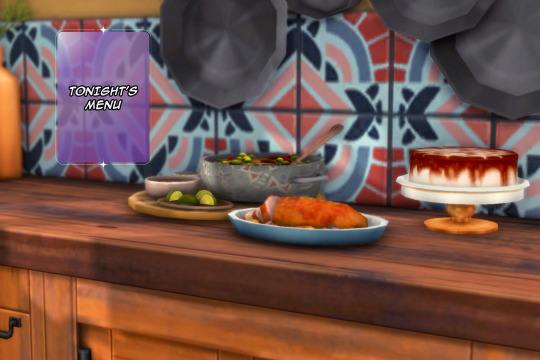
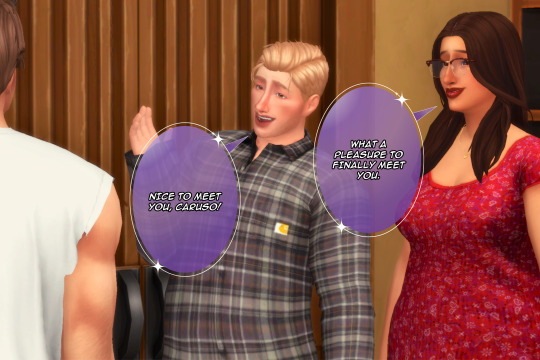
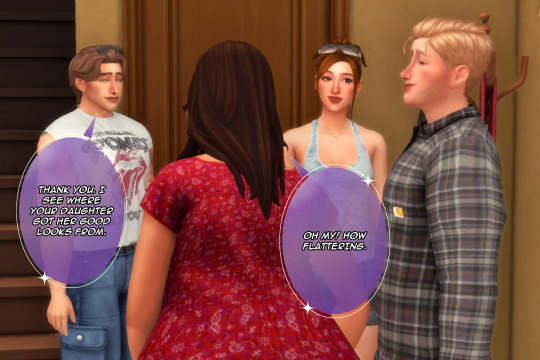

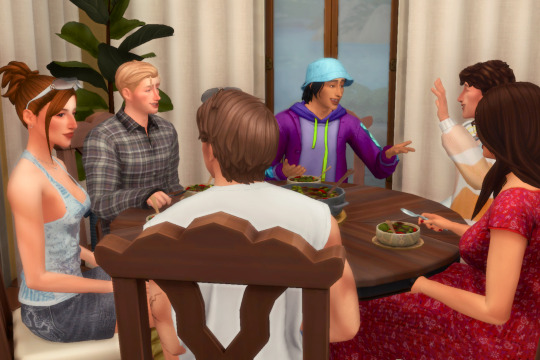
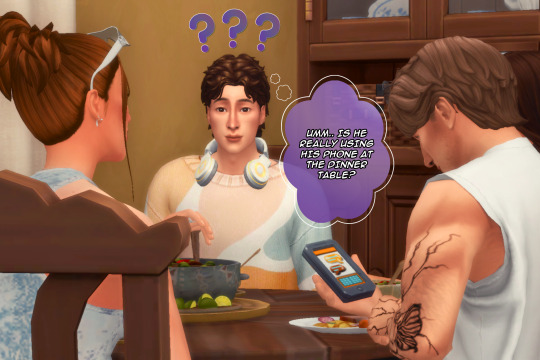
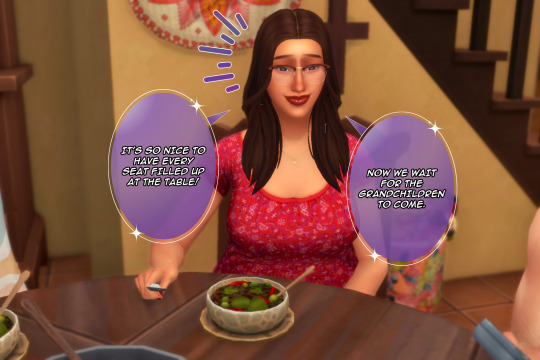
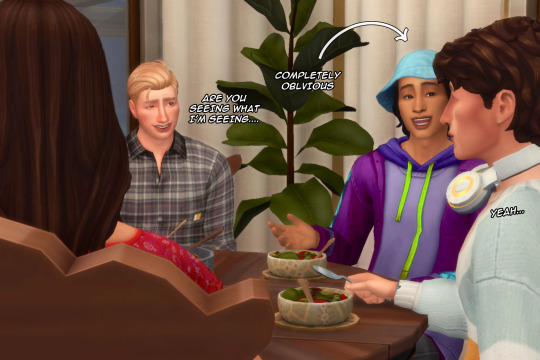

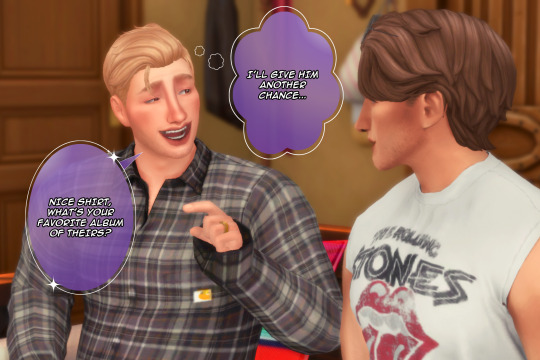
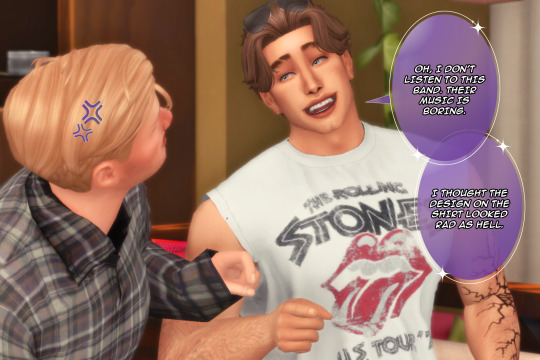
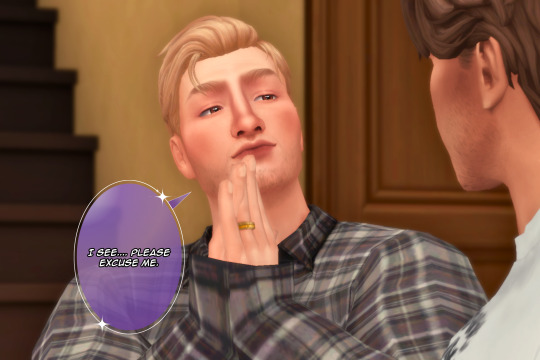


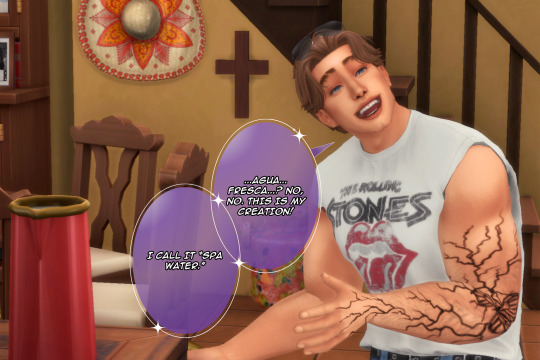

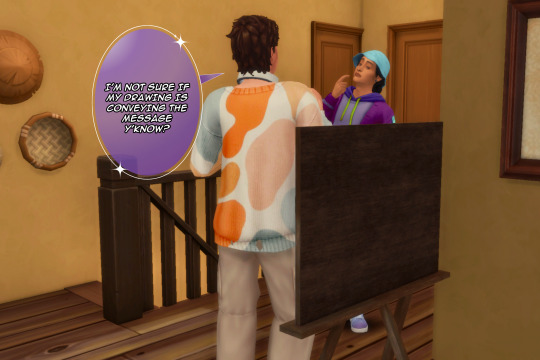
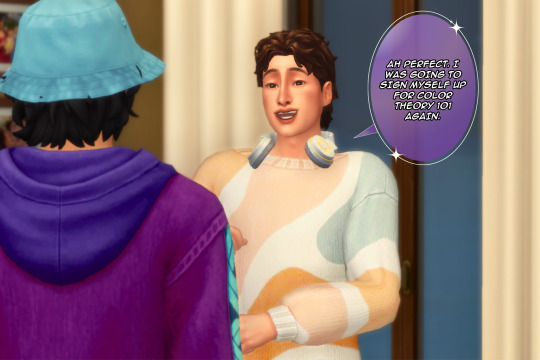
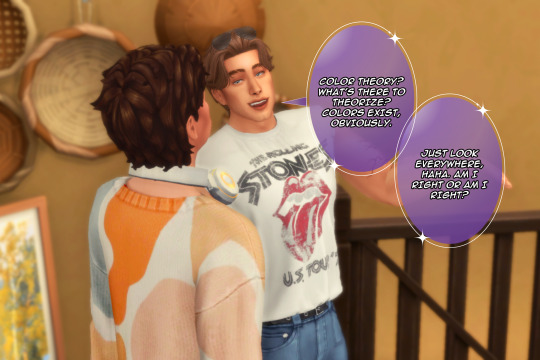
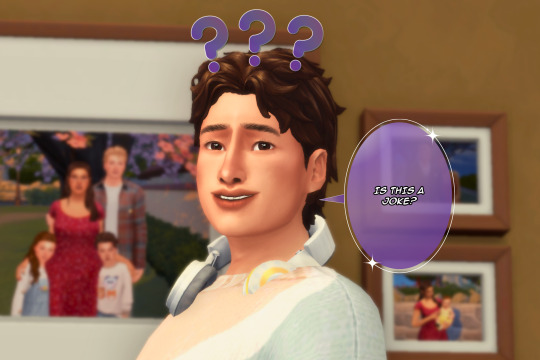



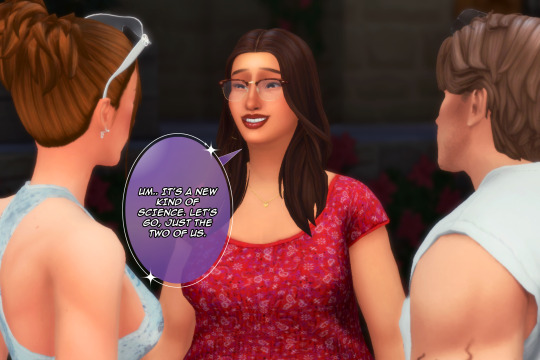
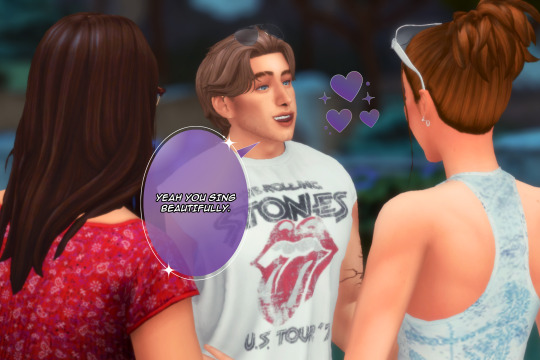

After about 10 months of dating, Dulce decided it was time for her family to meet Caruso, and well... let's just say that things could've gone better.... Will this shake things up in the Alegría household?
Note: For those who don't know, the "discovery" of "spa water" was a very real thing 💀 That sounds so unappetizing. Insulting in many ways lol.
Transcript
Erick: Nice to meet you, Caruso!
Noemí: What a pleasure to finally meet you.
Caruso: Thank you. I see where your daughter got her good looks from.
Noemí: Oh my! How flattering.
Ángel: Um... is he really using his phone at the dinner table?
Noemí: It's so nice to have every seat filled up at the table! Now we wait for the grandchildren to come.
Erick: [Whispers] Are you seeing what I'm seeing...
Pavan is completely oblivious, too in love with Ángel to notice anything.
Ángel: [Whispers] Yeah...
Erick: I'll give him another chance... Nice shirt, what's your favorite album of theirs?
Caruso: Oh, I don't listen to this band. Their music is boring. I thought the design on the shirt looked rad as hell.
Erick: I see.... please excuse me.
Noemí: Your agua fresca is amazing! It's agua de pepino, right?
Caruso: ...Agua... fresca? No, no. This is my creation! I call it "spa water."
Noemí: Oh... clever.
Ángel: I'm not sure if my drawing is conveying the message y'know?
Pavan: Looks great to me. The colors play into the theme of not escaping one's past.
Ángel: Ah perfect. I was going to sign myself up for Color Theory 101 again.
Caruso: Color theory? What's there to theorize? Colors exist, obviously. Just look everywhere, haha. Am I right or am I right?
Ángel: Is this a joke?
Noemí: Ahem... Mija, can you come help sing a lullaby to the fish? They won't sleep.
Dulce: Oh we have pet fish now? Since when do fish need music to sleep anyway? [Says quietly] Also, I sing well?
Caruso: Yeah you sing beautifully.
Noemí: Um... It's a new kind of science. Let's go, just the two of us.
#LONG POST..... my commentary tags will be at the end lol#noemi alegria#erick wade#dulce alegria#angel alegria#oc mlt: pavan shah#oc mlt: caruso#tjolc gen 2#alegria legacy#matchalovertrait#ts4 story#the sims 4#ts4 legacy#the first part with the “good looks” and noemi commenting on everyone eating together lowkey reminds me of shrek 2 LMAOO#my love letter to shrek 2 😍 best movie ever#i don't like the rolling stones either but what caruso said was basically illegal in erick's mind#anyway so what do we think is gonna happen 🤔#this is formatted as a “joke” post.. but is it... is it really.....????#is this a laughing matter?#we shall return on wednesday...
65 notes
·
View notes
Text




2024 year in review/art summary. i realized i never made these for 2021-23 either so here's all of them. i think i haven't been drawing as much these past few years, oh well support me on: patreon | kofi | redbubble
#year in review#art summary#i think in 2020 i got stuck on the decade review which i never finished and then didn't make these after#don't ask me why the formatting's so different#some of this art i haven't posted yet oh well.... some of it's in my queue.... i'll upload the rest later#2021#2022#2023#2024#for drawing less it's kinda because of having an irl job#less time and also kinda giving up on doing art for money#since now i can get money from job. and i wasn't very good at getting money from art anyway. also doing it for money made drawing less-#-enjoyable; this just didn't matter to me much tho. if it worked out i would've taken it as less enjoyable work rather than for fun#though in theory i would now be drawing stuff i actually wanted to draw then#but that takes more effort and i'm usually too tired#idk we'll see if this year's better since i'm working fewer days now#i was going to write this out too at some point but was tired of the performative aspect of social media so here's some info in random tags
34 notes
·
View notes
Note
do you have any more thoughts on sete&vale rivalry? ps. love your blog!
I ALWAYS have more thoughts about the sete/valentino rivalry and if there is one person on this website who wants to read them then let's fucking go. so my issue is that when I looked at this ask the first time I thought I could maybe give like. a few thoughts. just some casual fun takes. the problem is I've been doing that anyway in my other posts, but there's really only so much point in doing that if I'm not providing any context on events that are by this point two decades old. so. time for some actual context
this isn't going to be exhaustive by any stretch of the imagination. what I'm covering here is two/three incredibly interesting years of motogp that deserve to be experienced and studied in their entirety, but alas I am but one poster on one microblogging website. so this is very much going to be the whistle-stop tour of explaining feuds, before a little bit of analysis to cap things off. (would like to state for the record that I called it 'whistle-stop' when this post was a lot shorter than it is now, but I'm leaving this paragraph in because it'll get funnier the longer you scroll. it's still not exhaustive but it's a lot more exhaustive than I thought it'd be when I wrote those sentences)
this rivalry began in an odd, uncertain period of valentino's career, at a time when valentino had essentially won motogp. he had just concluded his 2002 season and sealed his second premier class title in the process, with his results that year consisting of eleven wins, four second places and a single retirement. it was more or less as good as it gets, crushingly dominant, the undisputed lord and master of all he surveyed etc etc etc. and yet it was also a time where he was ill at ease with his role within the sport and was struggling with motivation, so much so that he increasingly found himself no longer taking joy in his racing. he ended up being so disillusioned with the existing state of affairs that he decided to make a radical move to redefine himself, to control his own destiny, to take the step from a great to a legend
which is all very abstract, in a way, removed from the realities of racing or indeed competition. this was a time in which no other rider could come close to matching valentino as a competitor and everyone basically knew as much. it adds an odd flavour to the challenges an athlete faces, where the success is such that it warps everyone's understanding of what success even looks like (not helped by how the last dominant athlete in the sport, mick doohan, also had a silly good track record in his prime). you could say, if you want, that 2002 is all about sowing, all about vale having so much success that it's started to feel a bit too easy, where he was just coasting on a wave of his own brilliance. 2003? well, now we've gotten to the reaping stage, where he's suffering under the expectations he himself has created, and all this winning is maybe already getting kind of boring
the first task in sports is not to be better than everyone else - it is to win. being better helps, but it has never been strictly necessary. there was no serious question at any point during his rivalry with gibernau who the better rider was between the pair of them. perhaps even more importantly, there was no question who the stronger between the two of them should be. over the years, valentino would have to deal with more than his fair share of young talent who proved they could match him in ability, the riders who had already long been marked for greatness and had the potential to be valentino's successors to the throne. gibernau was not that man - he was older, he was less accomplished, he was a revelation rather than anointed. it's one thing to be challenged by an alien, quite the other to be beaten by a bog standard human. especially if the bar for what constitutes being 'beaten' is set pretty low - never mind full seasons, should you even be losing individual races to this new challenger?
the rivalry between valentino and sete is not one of two equals, neither in ability nor in how their success was measured. but it became one that spawned a close title fight, courtesy of valentino unexpectedly wrestling the yamaha into title contention against his former employers at the first time of asking. valentino's main pressures in those years did not come because of any other rider, including sete - they stemmed from external forces such as honda or the press, from his internal struggles, and eventually were self-imposed in his decision to take a step into the unknown and join yamaha. the shape that this rivalry took reflected the disparity between the pair of them at every stage. valentino's biggest enemy during those years only ever could have been himself - so could sete exert himself upon this narrative at all? was he only relevant as long as valentino let him be? has he been so conclusively beaten that he has allowed valentino to erase him from his story entirely?
the first task in sports isn't to be better than everyone else... but it usually isn't quite this low down on the order of priorities. when 'being better than everyone else' is taken as read, then where does the narrative tension come from? usually, this is the kind of issue that commercial stakeholders and broadcasters and journalists and fans care about - not the dominant athlete of the time. but valentino is a storyteller and he does care. he can't handle stagnation. he can't handle being bored. he needs something to fight for and someone to fight and he needs all of it to happen on his own terms. the rivalry between valentino and sete becomes about everything except who the better rider is - and they happen to be perfectly suited characters for a rivalry such as this. for something that feels a little removed from the typical pressures of competition, of simply doing all you can to win, to beat the other guy, in whatever way you can, to rack up one victory after the other... but what we're primarily talking about here isn't numbers, it's theatre. it's show. and it's about two men who are particularly in tune with the artifice of it all, who are particularly concerned with how the world perceives them. valentino always knows where the camera is, always knows to play to it - and sete knows where it is too, which is what valentino uses to unsettle him to the point of despair
so, that's the set-up. let's bring in the context. what I'll cover here is mostly limited to what transpires during the years in which the rivalry is at its most prominent, aka 2003-05-ish, and mostly stays away from its legacy or repercussions. the first bit covers sete's emergence as valentino's rival, then how he becomes honda's best hope of stopping valentino, then the controversy that ruined their relationship, and finally how sete falls apart. after that, I'll give some of my thoughts about the rivalry and how it functions as a narrative. but again, there's a lot that's being left out here - like the bits of my notes that are just a tally of every misfortune that befalls sete gibernau post-qatar 2004. remember, kids: curses are a nasty nasty business and should be wielded with care
becoming the challenger
sete's rise to becoming a legitimate title contender was in some ways as unlikely as the manner of his downfall. born in december of 1972, so six-and-a-bit years older than valentino, his grandfather was a titan in the motorcycling industry and he grew up both affluent and surrounded by bikes. he's unusually well-educated for a rider, proficient in languages even by paddock standards - and, like valentino, a bit of an aberration from the mould of the stereotypical nineties bike racer. the reputation he had was for being a bit too vain, a bit too metropolitan, too self-absorbed to be suited to the rough-and-tumble of elite motorcycle racing
by the time he signed with the gresini honda team in 2003, his track record was very far from that of a title contender. after various wildcards in the mid-nineties, he'd finally managed to get a permanent seat first in 250cc and then in 500cc. eventually racing for repsol honda and taking doohan's bike when he was injured badly enough to force his retirement, sete's initial promise remained largely unfulfilled and he was dropped by honda after the 2000 season. he joined suzuki, who were struggling immensely in the aftermath of their title courtesy of kenny roberts jr. sete did get his first premier class win in valencia in 2001 in mixed conditions - a rare race that year valentino did not win after making a conservative tyre choice at a track he's in any case always been dreadful at. in 2002, suzuki was still struggling, though the wet conditions in estoril gave sete a chance for an early duel with valentino until he crashed. valentino said afterwards he felt sorry for sete (in a nice way not a condescending way)
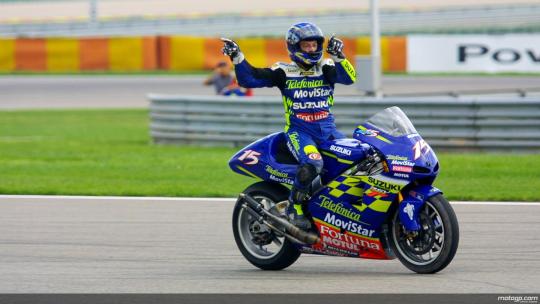
^sete's first ever win came in valencia far far ahead of valentino in a lowly eleventh place. incidentally, it was there that a year prior vale's late charge to an increasingly plausible rookie 500cc title came unstuck. it's fair to say it's not exactly his favourite circuit on the calendar, which some might call a sign of good taste
and then, the move to gresini honda in 2003 - to which he also brought his sponsor telefonica, who became the team's title sponsor for the next few years. as I'm sure fans of the current era are able to appreciate, while it might have been a step from a factory to a satellite squad it was a very obvious competitive upgrade. he may not have had the newest spec of honda, unlike his teammate, but he was still satisfied with his machinery and his new team
sete and valentino had already had a good relationship at this point, a friendship that extended beyond paddock walls. they'd get drunk together after races, party together on ibiza over the summer holidays - and of course there's the story of sete giving valentino advice upon his transition to 500cc. previously, valentino's most notable rivals had come from other factories, whether kenny roberts jr on the suzuki or max biaggi on the yamaha. but honda had poached biaggi for the 2003 season and - after a brief blip in 2000 -were establishing themselves once again as the overwhelmingly dominant force of the sport, boasting an embarrassment of riches both in the engineering department and in their formidable host of riders. they were the undisputed kings of motogp and were comfortable in knowing that their bikes were so good that the riders were far from essential, all easy enough to replace if they had to be. all of which meant valentino knew going into that year that his most significant challenges were likely to come from within his own house, though he would hardly have expected sete to lead the charge
but then, a tragedy in the very first race of 2003 changed things. in suzuka, gresini honda rider daijiro kato crashed and hit one of the walls, later succumbing to his injuries. kato had been a 250cc champion and was widely tipped as a future premier class champion, japan's best hope for a first in that category. even though gibernau and kato had only been teammates for a short time, sete had immediately felt welcomed within the team and had worked together closely with kato over winter testing, including helping him out in the wet conditions in which kato had long struggled
the brutality of racing is such that two weeks later, the grid were to line up again at welkom. and it was there that gibernau secured an unlikely, fantastical win from pole position holding off valentino along the way. he dedicated his victory to his fallen teammate - who he said had been with him when he was riding. he wore kato's #74 on his leathers for the rest of his career. whether rightly or wrongly, paddock consensus was that the events had transformed gibernau, had made him into someone who took his racing more seriously, had made him finally commit all his mind and body and soul to riding, to fighting, to winning
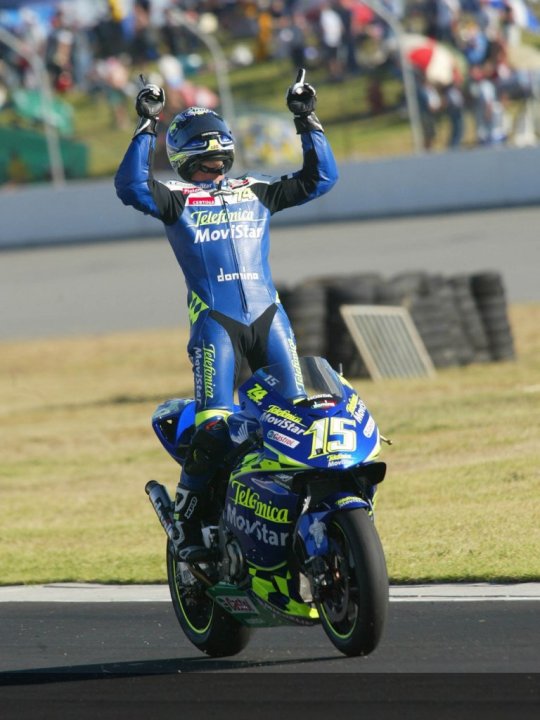
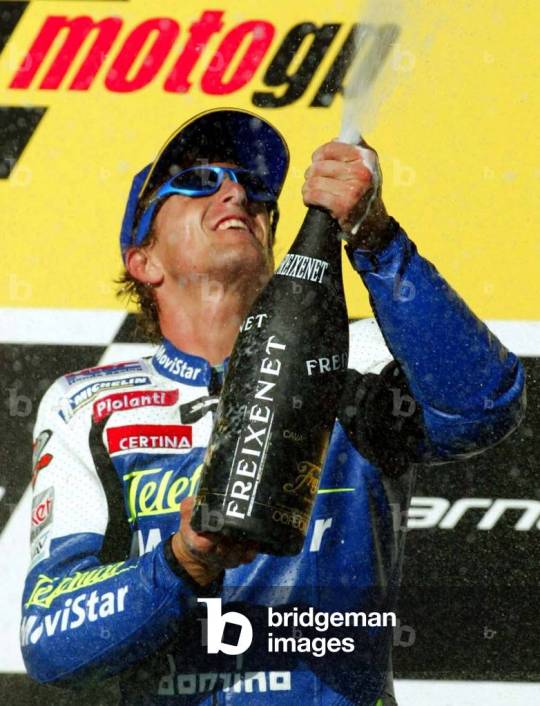
^pointing up to the sky at welkom 2003. the number 74 is prominently placed on his upper chest to the right
it also had another effect. kato's death sparked controversy due to the layout of the suzuka track, the decision of the officials not to halt the race, and the rescue workers who had failed to follow proper medical procedure in moving him. both sete and valentino reportedly said they would not race there again, and it did end up being the last year grand prix motorcycle racing came to that track. it also prompted conversations about what could be done to better protect riders - and sete was one of the main figures behind the idea that riders themselves should have more of a say in safety standards. this led to the establishment of the safety commission, which back then included fewer riders but both valentino and especially sete involved themselves in
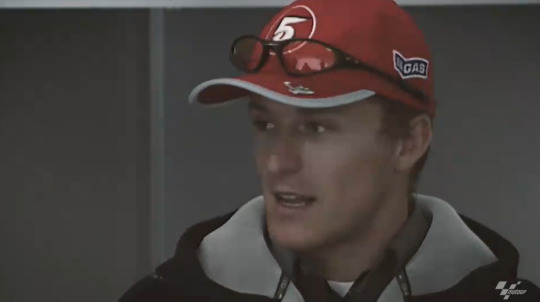
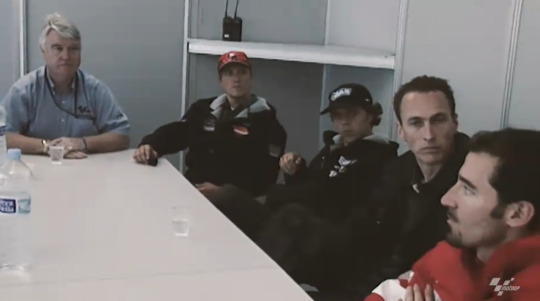
^sete at a safety commission meeting
did the tragedy really transform sete's fortunes as a racer? perhaps, though the switch to honda and a team he grew so fond of surely would have helped in any case. still, the contrast in his results and how he went about achieving them is stark; we'll never know for certain, but it's understandable why it's such a popular interpretation. another factor, too - despite some initial resistance, sete ended up inheriting kato's factory-spec machinery and was now riding the same bike as the other primary contenders of that season. the first half of his 2003 quickly cemented his new status within the factory, winning again in le mans, and then in assen. by the time they reached the halfway point of the season after donington park, sete was in second place in the standings, just clear of biaggi and only 34 points behind valentino
which is where we get back to valentino and ask ourselves what the hell that man thought he was playing at. did he really believe that it was all right to sit on a mere 34-point lead halfway through the season? was valentino, at the tender age of twenty four, already washed? was he finished? was this the beginning of the end? had he already peaked? did he just not have it in him any more?
obviously the answer to all of those things is 'no' and also 'what?' - but these were questions that many, most notably in the italian press, were in all seriousness asking anyone who would listen. now, valentino had theoretically just won in donington, except en route he had overtaken under a yellow flag and was controversially stripped of that victory after the fact. which meant that - you may want to hold onto something here - valentino had gone for a whole three races without winning. that's right. three races. granted, he'd already secured three victories that season and had been on the podium every single race, but the pressure was beginning to mount on valentino to deliver. it wasn't just the three race losing streak, but also the emergence of sete as a serious rival and how he had gotten the better of valentino - first at welkom by holding him off, then at le mans by beating him on the very last lap. valentino had also separately fucked up in a duel against capirossi for the victory in catalunya (funnily enough not one of the valentino duels there everyone remembers), eventually making a big enough mistake he had to spend the rest of the race recovering to second. honda had expectations, the italian press had standards, and the sheer dominance of his 2002 campaign meant that even the slightest dips in form translated into criticism of valentino and speculation on the state of his mettle or lack thereof. and things were about to get even worse
last race before the summer break and they're headed to the sachsenring - and here we were provided with a classic valentino performance right until the very moment where it wasn't. when sete caught up with him, valentino let him go ahead to study him from behind and crack him at the very end. he made his move on the penultimate corner of the race and successfully got ahead - but made a mistake in picking a very tight line into the final corner and lost too much speed, allowing sete to beat him to the line by a mere 0.06s. the general perception was that this had been a winnable race, and that it had been lost, more than anything else, out of arrogance. he could have attacked earlier - and if he didn't, then at the very least he should have been smarter about the final corner. he had allowed sete to beat him in a straight fight for the third time that year, who was now on four wins that season to valentino's three. all this meant that valentino's winless streak had been extended to four. that's right. you heard me. valentino rossi, the man they call the goat, had the audacity to go a whole. four. races. without. winning. the italian press had a field day and were calling for blood, and who could blame them?
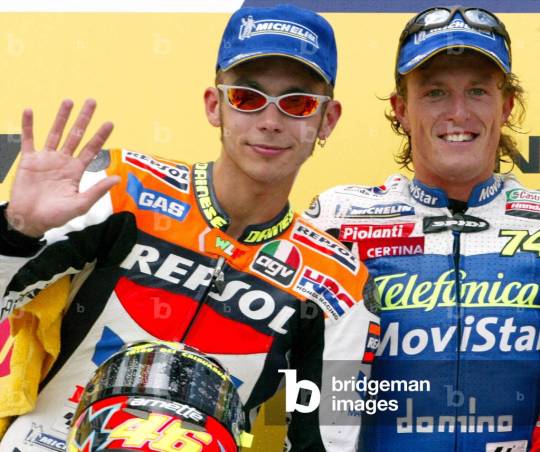
^sete gibernau posing for a photo with a washed-up loser
luckily, valentino had the summer break to go off and clear his head and think about what he'd done. it was a good chance to get away from the constant scrutiny and criticism that had come during a year in which he'd already been feeling discontent with honda from the very beginning. the perception was that valentino had had it too easy and was resting on his laurels, no longer taking racing seriously enough, coasting on past successes that he was finding it hard to replicate - never mind his 29-point lead in the championship standings. so valentino ends up doing what is sensible in that situation. has a hot girl crisis. goes to ibiza. gets his hair dyed red. rocks up at the paddock for brno with his cool new hair as a bit of a throwback - he's still that guy who knows to have fun, he won't let any of this get to him, he's not going to take any of this too seriously
here's a more in-depth post on brno 2003 including, of course, his celebrations. to summarise - he won a tight thriller of a race and this time beat sete to the line, just about. then he celebrated by having a bunch of his fans dress up as convicts and donning his own cap and ball and chain - a 'prisoner of his own success', if you will. another step was taken that weekend on the road that would eventually lead him to abandoning honda and signing with yamaha. and here he is in his autobiography talking about his disillusionment with honda. he's not the first athlete to feel unhappy within his team, not the first dominant sportsperson to struggle to find motivation. still, when you consider how long his career ended up lasting, there's something remarkable to how quickly it threatened to turn joyless to him. if he were one of those athletes who just needed to win to be happy, he would have been fine within honda
but that's what valentino's all about, isn't it. within honda, under the ferocious glare of the italian press, he felt trapped. he felt imprisoned. he felt burdened by the expectations that his own victories had placed on his shoulders. it isn't enough for him simply to win. not if the winning isn't happening on his own terms. not if it's just another way in which honda can show off how superior their bike is. just another means for the italian press to ramp up pressure on him in the future. if valentino doesn't win, then well, it'll be gibernau. it'll be biaggi. who cares? valentino isn't essential to honda's success - the bike is. and vale decided he could no longer accept that. he returned to his roots in brno with the haircut and the celebrations and the candlelight meetings with yamaha that demonstrated his determination to forge his own path. winning is a part of him; when he wins he uses it to express himself, to define both who he is and who he is not - which is where, of course, the rivals enter the picture. valentino delineates his self against the other as much as anyone does, expressing his identity both as a racer and as a person by drawing the line between himself and his enemy and making a spectacle of what separates them. you can only win when you beat someone else, and valentino has always understood that the vanquished is very nearly as big a part of the show as the vanquisher
but here, the relationship between valentino and sete was at the very least outwardly still warm. they were both as gracious in defeat as they were in victory - helped along by the awareness that whatever the frothing italian press might pretend, valentino was unlikely to lose that year's title. still, were tensions beginning to creep in, given how valentino retrospectively speaks in his autobiography about how both biaggi and gibernau complained he had superior machinery? how about when rumours began to fly about valentino's impending move to yamaha and sete supposedly said valentino won't have so much to laugh about the next year? or the glee valentino read on sete's face at the thought of valentino's departure from honda? another point, on the ibiza trips - it's unclear when and how many times they happened, but one source suggests they had stopped in 2003. on the other hand, the brno 2003 race commentary makes multiple references to how they'd been partying together on ibiza during the summer break (which you'd have to say is pretty remarkable in itself after a race like sachsenring), and I'm inclined to trust the race commentary on this one. so maybe it's 2004 the trips tail off... at what point then did the relationship between the two of them begin to transform from friends to true rivals, however genial to begin with? how wary had valentino already grown of sete by the end of 2003?
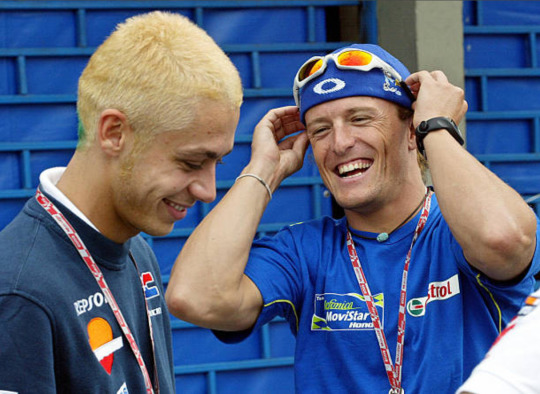
^age old tradition. sete buddy that kid is going to ruin you
in any case, the remainder of valentino's season was close to flawless, winning five of the six remaining races. in sepang, having already decided he was going to sign with yamaha come what may, he sealed the title with a dominant win over sete - and brought back the convict celebrations, except this time he had a big novelty key to open the big novelty lock, presumably to signify how he could finally escape. which is charmingly on the nose, yes, but there's something enjoyable about an athlete who is so very committed to making the subtext text. how better to conclude his time with honda, who he had grown so very disillusioned with? tell them how you really feel and all that
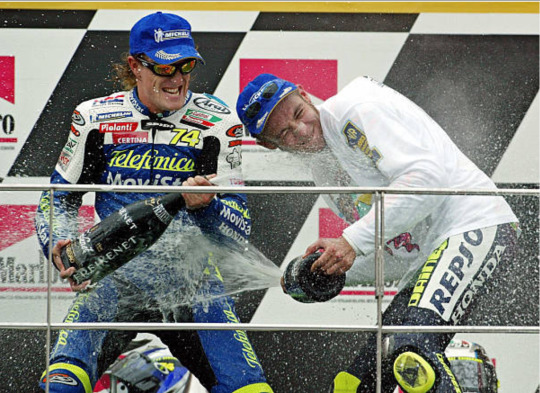
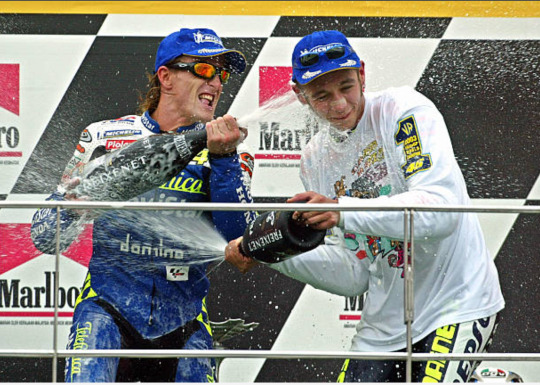
^after vale has sealed the title at sepang. sete gives him a nice little kiss before assaulting him with champagne on the podium
or - not quite to a conclusion, not yet. after all, there were still two more races to go in 2003. in phillip island, he secured one of the more spectacular victories of his career when he once again fell foul of the 'could you please stop overtaking under yellow flags' thing - but this time, was informed of the situation and his ten second time penalty during rather than after the race. furious at the penalty, he flew off, setting a blistering pace that not only gave him the requisite ten second margin over his closest challenger capirossi, but eventually meant he crossed the line fifteen seconds ahead of his countryman. he had a point to prove that day, and proved it. he might have been on the best bike, yes - but he was laughably better than anyone else riding it, and the world still hadn't seen yet all that he was capable of
then came the last race of the season and the announcement honda and valentino would be holding a press conference together afterwards, widely expected to be announcing a split that for much of the year the paddock refused to believe might actually happen. one more ride on the honda that valentino must say farewell to and will dearly miss - that unfortunately took place at valencia, an ugly bore of a track that valentino has always been awful at, the only one on the calendar he had not yet conquered. but he needed to say goodbye to his beloved bike (decked in an austin powers-themed special livery) in style, and he went on to win the race before telling the world that him and honda were parting ways. time to go to yamaha and prove the haters and losers wrong - including one sete gibernau
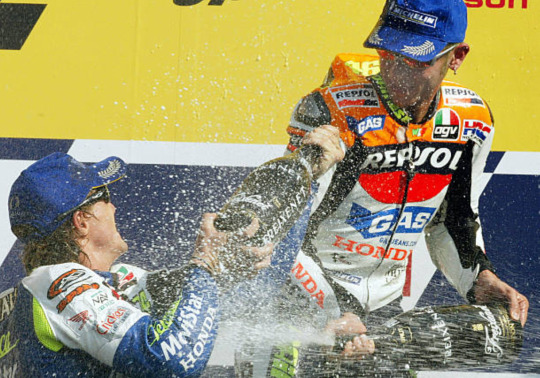
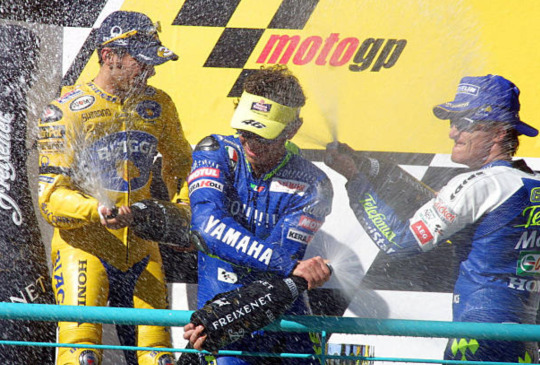
^honda or yamaha, friendship can survive anything <3 quite like valentino's unorthodox spraying technique in the photo on the right - sete was admirably determined to drench vale at welkom
honda's next champion?
the thing about 2004, right, is that the dominant rider in motogp had very nicely taken himself out of the picture for at least a year to try and turn that useless pile of junk into title-contending machinery. maybe rossi would start turning things around in the second half of the year and snatch an occasional win. maybe he'd put together a title charge in 2005, though that was by no means guaranteed - it was entirely plausible that his failure would be as complete as it would be spectacular. what this meant for everyone else was that they'd basically been given a freebie. a clear run at the title, as long as they could beat all the other non-rossi challengers. for a number of blokes at honda, this was the big year. biaggi, gibernau, anyone else who was feeling brave - this was the time. and honda, right, were going all in on this. rossi had the audacity, the nerve, the sheer disrespect to turn his back on them and imagine he could win without them. every rider dreamt of being decked in their colours, and valentino had walked away. they were going to throw all the considerable money and resources at their disposal behind a small army of riders, tasked not only with beating rossi but humiliating him
this is all a bit of an exaggeration, but not too much of one. as then-yamaha rider and then-valentino friend marco melandri put it in 2003, "if valentino did come to yamaha at least he would be able to give them direction with development, but he would not have a chance of winning". the best-placed yamaha rider in the 2003 championship standings had been carlos checa in seventh, and all yamaha riders combined had achieved a grand total of one podium finish that whole year. generally speaking, however, once this kind of idle speculation of 'oh imagine if he moved' actually becomes reality, the conversation does shift accordingly, and so the initial consensus of 'surely he can't win on a yamaha' of much of 2003 was already beginning to crack by the time they actually arrived at welkom. and the relationship with honda really did end on a pretty sour note, not least because valentino's former employers refused to let vale test the yamaha before his contract expired at the end of 2003 - which is generally a pretty decent barometer of whether a rider and team are parting on good terms. as valentino put it: "their attitude pissed me off. it will cost me four races, but I always knew things would be like that". in the end, obviously he was still able to make good use of the pre-season testing he did have and he was not cost "four races" - and at the very latest people had to reassess their outlook on the season when he hit the track at welkom. if anything, his immediate pace that weekend was distinctly un-valentino-like - who needs to already be fast on a friday? - and he led every session and qualified on pole. and then, he went and achieved what still remains possibly the greatest victory of his career after a thrilling battle with old foe biaggi right to the very end. sete was a very distant third
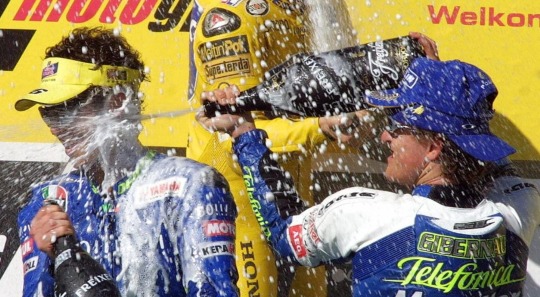
^sete drenching vale at welkom. I am once again going to do 2004 prop and let you know that some of the best races are available free online: welkom, mugello, catalunya, assen and qatar are all on youtube (they should upload phillip island but ah well ed.: for some reason phillip island has been uploaded to facebook)
of course, valentino did not have it all his own way that year. of course, sete was not suddenly replaced by biaggi as vale's prime challenger. but yes, sete will have had to readjust his expectations of valentino's season the same as everyone else. after welkom, the conversation shifted definitively from 'surely not' to 'could he really...?' - and all other contenders were informed in no uncertain terms that they were not to be granted a rossi-free season. that being said, of course this still very much looked like sete's best chance. of course this wasn't going to be as straightforward as valentino's past titles. perhaps, even, welkom had provided a somewhat illusory picture of what the competitive landscape actually looked like that season. perhaps people had been too hasty to hand the title to valentino again after welkom. a wet weather specialist, sete secured victory in a rainy jerez, while valentino struggled to get his yamaha to work in the wet and finished fourth - his first time off the podium in twenty four races. at le mans, another race in tricky conditions, sete won once again and extended his championship lead while valentino took another fourth place. the spectacle of welkom might have been a flash in the pan; it might be time to reassess the kinds of results valentino could achieve on a regular basis with that machinery
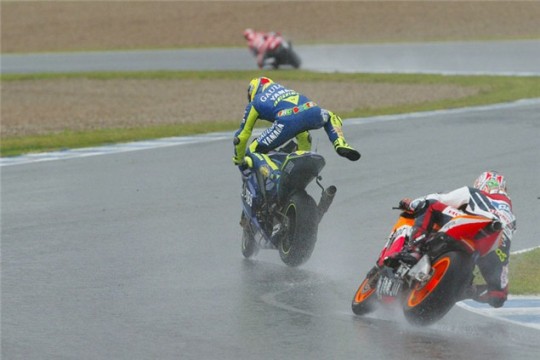
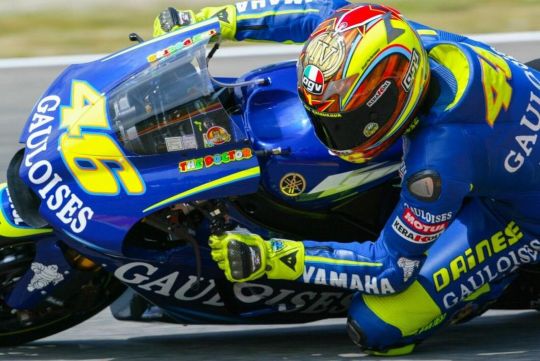
^left: valentino having fun in the wet of jerez; right: valentino's wood-themed helmet for mugello, because if you finish fourth you get a wooden medal
what followed was a pivotal stretch of three races that turned valentino's 2004 title bid from a dream to something that felt increasingly plausible, even likely. all three of these races were extremely closely fought. all three of them are very enjoyable to watch. all three of them are freely available on youtube dot com. first, they headed to mugello, a big one for both sete and valentino. valentino had won the last two races at mugello and it was the race that was more important to him than any other - so if you're sete, where better to stamp your authority on the season? the race ended up having a little bit of everything: a ferocious multi-rider scrap, a duel between the two main title contenders, a red flag and a restart due to the worsening meteorological situation that resulted in another multi-rider scrap. valentino had to make full use of his skills as well as his composure to go out and in essence win two entirely different races. after the second start he fell back as far as seventh as he figured out the grip conditions, taking his time to fuck around before eventually fucking off (or as much as you can fuck off when you only have two and a half laps left). still, sete managed to salvage a second place result and limited the points damage
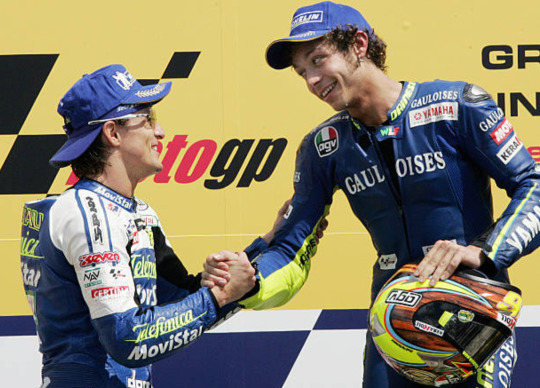
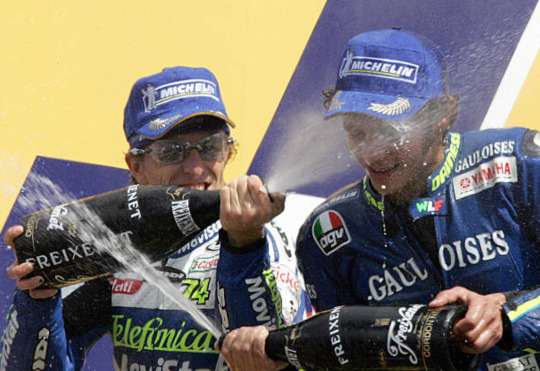
^2004 is as close to a perfect season as you can get, but there is one major factor that holds it back: the colour schemes of the title contenders. extremely similar combinations of blue with a little yellow from guys who aren't even in the same factory, let alone teammates - and jorge was always way easier to distinguish from valentino than this mess. what makes this extra stupid is that valentino's actual teammate that year, carlos checa, had a RED livery and RED leathers so. okay. great job guys. anyway, cracking race, split into two halves (or well. four fifths and a fifth). apparently, sete overtook valentino at some point under a yellow flag - or, at least, valentino says he did, which is something he remembers just in time for that year's sepang press conference
so a home victory secured and a hat trick of mugello wins - time to head back to sete land and fight it out in catalunya. top five valentino catalunya duel for sure, a pretty crowded category. sete had led every single session going into the race, but in the end he came out second best in a fight that went on until the very last lap. no longer was valentino willing to let sete get the better of him in head-to-head combat, and the victory was even sweeter coming as it did on sete's home turf - and indeed valentino would establish a bit of a tradition of beating spaniards at that track. the tide was turning and increasingly it did look like valentino might actually achieve the impossible
"One hundred and five thousand screaming Spaniards roar on their hero Sete Gibernau. He's something of an unexpected hero really. After so many years in grand prix, he lived in the shadow of Alex Criville. Criville's retired, Gibernau is on the Honda, and Gibernau is leading the world championship."
^excerpt from the catalunya 2004 commentary
and then, the next race: time for assen
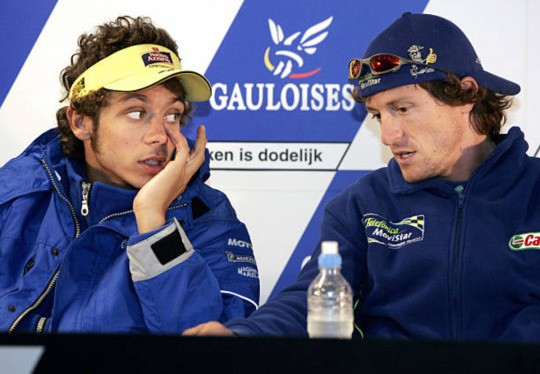
^still friendly and chatting before the first real trial their relationship faces. by the by, the commentary for this race references a cartoon proposing that all that valentino needs to do to keep sete behind him is to attach a mirror to the back of his bike - because sete would be too busy posing. which gives you a general sense of the tone people used to discuss sete with
coming into this race, sete had gotten two consecutive second places to valentino. his championship lead had shrunk to five points. valentino had already gotten the yamaha into race-winning shape sooner than anyone had expected, and now it increasingly looked like he might be able to achieve the week-to-week results that won championships. it also did not help that sete's defeats had come in direct duels with valentino - in the early days of that rivalry, this exact type of duel had been how sete had announced himself as a serious threat. if it came down to another direct fight between the two of them, sete badly wanted to get a win over his rival, not just for points but for pride. and valentino, conversely, wanted to press home the advantage, to bite harder when his opponent was already bleeding. if you will
this turned into a bit of a three-way tussle between those two and barros, but then barros crashed out and it was just the two of them - going into the very last lap with sete ahead. valentino, who was having to risk far more on the yamaha than he ever did on the honda, made a lunge up the inside of turn 12 and almost binned it in the following corner. nearly losing the front resulted in contact with sete, where sete's front wheel hit the rear of vale's bike and damaged the front mudguard - and in the end sete backed off just a touch, allowing vale to cross the line with almost half a second in hand
valentino was enthusiastic in his celebrations, shall we say, whereas sete... well. sete did not look thrilled. gone were the usual parc fermé exchanges, no more hugs or friendly handshakes or kisses. sete suffered his way through the podium celebrations as the wettest of wet blankets, popping the champagne for about half a second and staying rooted in place while valentino carried on doing his thing. the natural assumption would be that sete was furious not just at losing but at the manner in which the pass for the victory was executed, out of control and in a way that could have easily resulted in a crash for both of them. valentino certainly assumed as much, saying that sete was "for sure a little bit angry" (clip here, also includes sete's statement). but when it was sete's turn to speak... he just said he was frustrated at losing, as anyone would be in his situation. which, well, doesn't quite fit in with his reaction, and also doesn't entirely match up with other statements he made at the time. there are two more sets of quotes from the protagonists of the race, though I can't determine with absolute certainty in which order these things were said. here's the first (article dated day of the race):
Gibernau lost vital time in that clash and was not able to challenge on the remainder of the lap but Rossi insists he did not deliberately block the Telefonica Movistar Honda rider. "I came into the bend a little too quickly and I slightly lost control of the front of my Yamaha, which explains why I touched him, but it wasn't intentional," he said. Gibernau did not use the incident as an excuse for his defeat. "To be overtaken in the final meters after dominating the race, it's obviously gutting," said the Spaniard. "I was angry about the way he overtook me. His manoeuvre really was risky. He said he didn't do it on purpose, but it doesn't take away my disappointment."
and here's the second (article dated the day after the race):
"I made a mistake and had to brake early or I would have crashed," said Rossi, explaining why he slowed so suddenly in front of the Spaniard. "I did not even feel Sete touch me. He was very angry, but I explained what happened." For his part, and after having chance to cool down, Gibernau appeared to accept that the contact hadn't been deliberate. "I had a good chance right until the end but we touched on the last lap - Valentino explained that he almost fell and, if that's the case, then there's nothing for me to say," shrugged Sete. "These things happen in racing. We had a good battle in another great race."
if that indeed is the order in which their statements were delivered, this whole episode feels like an interesting exercise in passive aggressive feuding - sete could have of course simply gone up to valentino, supposedly his friend, and asked for an explanation, or stated his objections openly when asked about them in the presser. instead, it seems to have been valentino who offered his explanations after sete had denied even having any issue with the overtake, with sete contradicting himself later by saying he had been angry. even then, sete said it didn't "take away my disappointment", which suggests not all was forgiven. from parc fermé to the podium to the press conference, he'd used every part of his body with full effect to express his displeasure with the notable exception of his mouth. this incident hasn't really been brought up by either party since, but as far as the eye test goes the relationship sure seemed like it was pretty strained by this. with the benefit of hindsight, it stands out as a turning point in their rivalry, the first time the veneer of the gracious loser was well and truly discarded and a sour note was added to the relationship. this was also the race where the championship lead was taken away from gibernau on countback, which incidentally was the last time an independent rider led the world championship standings until... uh... *squints at notes* argentina 2018
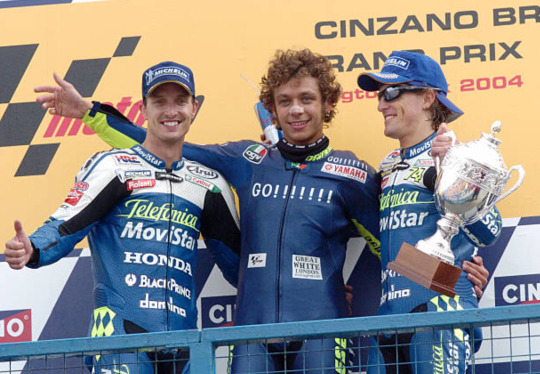
^already post-assen - but no reason not to be civil, right? what's a little last lap assen controversy between friends. scholars will note that this is the race after which valentino engaged in some unsavoury parc fermé activities with sete's then-teammate colin edwards
for the sake of brevity, the next part of the season is mostly going to be skipped over, but to give you the sparknotes version: sete's results grew more inconsistent, and valentino gained more of an advantage, despite still having to over-ride the bike in a way that helped cause his dnf in rio (his first dnf since brno 2002 and his first non-mechanical dnf since mugello 2001). apart from a brief period where biaggi seemed like he was going to reinsert himself in the title fight, plus a sete win in brno, for the most part the tide had clearly turned in valentino's favour and that yamaha title was looking more and more like a certainty. so let's pick up the narrative at the next major flashpoint between the pair of them, at motogp's first visit to qatar
I've already written up a post that gives more information on that race and the specifics of the controversy, so I'll forgo another detailed summary of events here. the basic facts we have at our disposal are that valentino's team, whether to his knowledge or not, rubbered up his spot of the grid, and he was then penalised for it. he worked his way up from the back of the grid before crashing out of fourth place. sete won, reducing the gap separating the two riders at the top of the standings to a mere fourteen points with three rounds to go. valentino was furious at sete, at honda, at the stewards, at pretty much everyone. here are some of his remarks:
"Gibernau's victory is not real. They stole the match from us with the shameful farce of the penalty. A truly incredible situation occurred. Everyone cleans the starting 'box'. Is there a written rule? In Rio we all went to wash the track, which was dirty. The same thing happened here. In F1 the cars skid, the asphalt is cleaned with the motorbikes. After Friday's practice [before the Saturday race] we saw Biaggi's mechanics cleaning the track and we thought it was a good idea. We cleaned the track and Honda screwed up. The others have to attach themselves to something. Gibernau and his chief suspension mechanic didn't hesitate to snitch like kids. Something ridiculous. I didn't expect to get to this point. In the race I gave a lot in the early stages, after two corners I was eighth and after four laps I was already in fourth position. I spent a lot and relaxed for a moment. Unfortunately I went wide and couldn't find the curb anymore. I made a mistake, but I wouldn't have made such a mistake if I had started from the front. I hope to make up for it in Malaysia, fortunately I didn't get hurt in the crash. It went well for the finger, when I saw the blood I was scared. But the finger didn't explode."
^some of these websites have a habit of collating a bunch of different answers into one paragraph of remarks but personally I am choosing to believe he did actually deliver this as a single monologue
valentino also said he had been looking for an excuse not to speak to sete, called him a child, saying sete had essentially stabbed him in the back. and of course, so the legend goes, he infamously vowed that sete would never win another race again
who snitched?
everything up until now has been more or less just summarising events as they happened - but now we enter considerably murkier waters. we do not definitively know one way or another what happened in qatar, who said what, who was responsible for what. let's get the less important mystery out of the way first: did valentino really curse sete?
no, not in the sense of 'did valentino rossi really perform black magic' - more the question of if he ever really said it. a lot of journalists who are otherwise at least mildly reputable seem to take it as read, but also a lot of journalists are motivated to believe he said it because it makes for a fantastic story. when did he say it? to whom? one source talks about it being at the press conference of the following race, which I know for a fact is not the case. here's a source that is one of the ones to have swayed me more to the side of 'yeah maybe he did say it':
Rossi then did an interview with Italian TV. He’d hurt his little finger, really mashed it up, in the crash. And he famously said “I will make sure Gibernau will never win another race because of this”. We’ve all got a soft spot for Valentino, and I can remember thinking ‘oh God, I wouldn’t have said that if I were you. I really wouldn’t have said that…’
I know this is objectively not a lot to go on, but at least it's a commentator/journalist who was there at the time, claiming they remember finding out about it, giving a little detail about to whom it supposedly was said ('italian tv') and having an immediate response to it that they are also remembering. obviously, this too could be bogus. but, well, at the end of the day I'm with the journalists here: I too want it to be true because it is indeed a fantastic story. there has also been the suggestion, again poorly sourced, that valentino has denied saying this - or, and this genuinely would be my favourite option of them all, that he said he only meant it for that year. hate it when I place a curse on someone and it accidentally lasts too long
now that I've done my due diligence, here's the good bit: beyond a certain point, it does not matter whether valentino actually said it or not. what mattered is that everyone thought he said it - and, crucially, as 2005 wore on, it became ever more part of the discourse. it was part of the reporting of races: could gibernau finally break the curse? it was discussed extensively in the commentary: we're back in qatar, do curses have an expiration date of a year or not? there is no way that within the claustrophobic world of the motogp paddock sete would have been been able to avoid it, let alone be unaware of it entirely. (incidentally, the fact that this is the case and I've not been able to find a better source of valentino denying it makes me again feel like he did actually say it - though I suppose it'd also be pretty funny if he hadn't said it but was like. actually this is working out quite nicely for me.) assuming for a moment that valentino is not capable of literally cursing people, the 'real effect' the curse can have is only in tormenting its victim through the mere knowledge of its supposed existence
but we're getting ahead of ourselves here. whether the curse existed or not, it could only have the effect it had if valentino fulfilled its initial promise - by denying sete another win that season while securing the title for himself. so let's just quickly recap where we're at: three rounds to go, fourteen points between the two contenders. valentino went back to italy to try and fix the fucked up finger and presumably to cool off a bit. the motogp media did what it does best and spent the entire week hyping up the drama. and there was, of course, another mystery everyone was still trying to get to the bottom of: was sete really involved in valentino's penalty?
let's first tack on another question: does it even matter? of course, the truth has never been established with 100% certainty either way, and all it does is give the two parties a reason to blow up a friendship that was already getting a little bit strained. either way, the relationship between them was ruined; either way, valentino crushed sete. not just that - whether it really happened or not is one thing, but I feel just a touch more confident in asserting that valentino believed it happened, just from my extreme vibes-based analysis of how genuinely furious he seemed and how he was still referring to sete's dirty games a whole eleven years later. which, of course, doesn't in itself really tell us one way or another what actually happened. valentino can convince himself of all manner of things. if anything, his track record as well as how ruthlessly he exploited the situation to his own advantage count against believing his version of events. and, at the end of the day, only one of valentino and sete can speak to sete's involvement in the protest that caused the penalty with complete certainty. it's not valentino
and in a way, it doesn't really matter. sete is unsettled either way - because even if he did have some hand in the penalty, this is the kind of low level petty snitching athletes and their teams constantly engage in. I cannot imagine he would have thought valentino would react as he did. quite honestly, I'm not sure sete could have conceived of a rival reacting like that to anything. if sete was responsible, then valentino still managed to escalate to a level of hostility sete would never have been able to match, let alone be comfortable with. obviously, it would not be in his interest to retroactively admit any involvement in the matter, not least because he saw how valentino responded to the mere assumption of sete's guilt. it does, however, still matter in evaluating sete's assertions that the relationship between them changed more or less from one day to the next (which *gestures at the above wall of text* I'm not entirely convinced by), and in judging whether this is a feud that's entirely built on the back of valentino's delusions. was sete really completely unaware and, a separate question - was it an unreasonable assumption from valentino that he was involved? if both of those questions are answered in the affirmative, then you do have to say what follows must have been absolutely bonkers from sete's perspective. I mean, it's kind of bonkers anyway, but. y'know. even more so
the problem with actually evaluating the claims are that basically every source about it frames the whole thing differently and often in contradictory ways, to the point where even valentino's actual allegation has been shrouded in the mists of time. different journalists and commentators and authors after the fact have confidently asserted that either hrc or sete's gresini team lodged the protest - some seem to take it as read that sete did indeed have some kind of role in it, and there is no indication whether they have some kind of privileged information that backs this up or whether this is simply valentino's influence making itself felt. hrc is obviously a likely suspect, given they canonically hate valentino and are praying for his downfall and have invested a whole lot already to bring it about. then again, gresini are the ones who are actually in this championship battle - and, of course, there's the distinct possibility that all parts of honda were involved in this together. other figures that have been brought up are gresini team principal fausto gresini who it has been claimed was personally involved in making the protest - this from the stuart barker biography, which treats it essentially as established fact. the barker biography also says that yamaha was not found to be breaking any specific rules, but race direction said it was against the 'spirit' of the sport, which... okay, I'd also be pretty annoyed to be penalised for that, especially at that stage of the season. while it is of course possible that sete was not involved in his own team's actions, it does seem a little less likely that he would not have at the very least been informed. to add another twist, one version of the story that has cropped up more than once is that valentino's allegation was that sete and his crew chief juan martinez went to hrc to get them to go to race direction. also, it may be that ducati protested both valentino and biaggi (who was definitely breaking the rules). which, good on them
unfortunately this is pretty inconclusive stuff and at a certain point it feels like you have nothing better than gut feeling to rely on to choose which narrative is more convincing to you. which is annoying! where's the substantial evidence! nowhere, it appears, not that I've been able to find it - but there is one more tangible source that I haven't brought up until now. you see, dorna, in their infinite commitment to the bit, have been kind enough to make the thursday press conference at the very next race one of the very few of that era that they have uploaded in its entirety. I am talking, of course, of the pre-event press conference at sepang
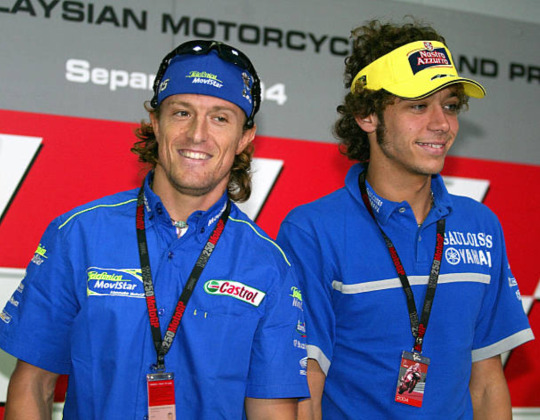
^posing for a friendly post-presser photo <3 two guys just chillin' having fun having a laff
if you are an aficionado of awkward and tense and kind of awful press conferences, then you will have an excellent time with this one. I've uploaded pretty much all of the relevant bits that I'll link to as I go; they're not obligatory watching to understand the rest of the post as I will be covering them here anyway, but they sure are interesting (and funny, which is really the most important thing)
first, let's set the scene: four blokes sitting at a table. the seat at its centre sits empty. the championship leader has not yet arrived when the press conference starts, removing the opportunity for one of the most sacred rituals that preempts any motogp press conference: the vibe check. a lot has happened and a lot has been said since the relevant parties last saw each other face to face and it is unclear where the vibes will be at when the reunion happens. will they acknowledge each other? make eye contact? shake hands? speak to each other? the journalists have not had a chance to find out. and one of the two involved parties has not either
after some softball questions relevant to 'racing' and 'points' in 'motogp' and its 'title fight', the moderator finally gets to the bit everyone's actually here for: the drama [1]. at this point, sete dates both the presser and himself by saying he's been trying to block everything out with his "mp3", before expressing his sympathy for valentino and saying he doesn't hold any of valentino's words spoken in the heat of the moment against him. at some point, he delivers a couple of lines that possess the kind of concentrated narrative juice you get a sugar high from, saying "we all know valentino. I know how he really is, he's a good guy". just as he finishes answering the question, his eyes flick over to the side - and the camera pans over to valentino entering the room with a slight smirk and of course his big ass sunglasses still very much adorning his face
nicky hayden sits to valentino's left and is interviewed before valentino is - while valentino does not acknowledge sete, who is sitting to his right. when he is questioned [2], valentino initially sounds like he is intending to turn the page on the whole affair and if anything doesn't particularly want to comment any further on what has happened. he also manages to deliver a truly classic motogp rider line, saying "I have a hole in the finger, but I think it is not a big problem for ride this weekend". right! but already here, it becomes swiftly clear that he is still furious at what happened and aggrieved by the penalty. he caps things off with a nice line saying that at least he wasn't actually slower than 'gibernau' in qatar, before turning around and shaking hayden's hand and chatting to him
it immediately becomes clear that all the questions from the floor are going to be about the same thing [3], and sete looks miserably uncomfortable while valentino just comes across as incredibly surly, his smile at times taking on a mildly murderous quality. one journalist fires off an all time classic presser question with "in qatar you say you were searching for an excuse to not talk any more with sete" and again valentino side steps, half-making it sound like he's willing to move on - while sete continues to strike a conciliatory note, continues to stress how it was all just the heat of the moment. but a follow-up question to valentino gives the journalists and sete the clearest indication that this, in fact, is really happening. valentino says this is not in the past, that he'd already said what he thinks last week and is standing by it. sete looks over at him - with disbelief, with incredulity, with the air of a man who really can't quite believe the turn this has taken
if there had been any lingering doubt at how unfairly treated valentino feels, he dispels it in his answer about stewarding decisions [4]. at the end of his exchange with the reporter about it, he brings up an incident where sete overtook under a yellow flag in mugello - which, quite honestly, I had not known about and I haven't found any reference to, so maybe nobody did spot it at the time if it indeed happened. remember, valentino had gone through not one but two bad run-ins with the yellow flag situation the year before, costing him a win at donington and making him ride at his limit to reclaim the win at phillip island. did he speak about this mugello situation at the time, or has he really just carried it around with him silently for months? a professional grudge-carrier, you have to say, a true master at the art. at the next question, valentino continues putting space between himself and sete [5], saying they have been rivals for a long time and that "it's the same condition" (i.e. situation). the friendship isn't just gone, it's so gone it might as well have never existed. if you really want to read more into this than the short response deserves, you could argue he's saying the facade has been lifted, that the true nature of the rivalry has been revealed at last
and now, we get to the critical part: sete is invited to explain himself and tell the press whether he had any involvement in the penalty or not [6]. he's clearly put a lot of thought into this in the past week and decided what he should focus on is that he wanted all the grid slots to be cleaned in the interest of safety. interestingly, he says "they" blocked him from doing that, but it's unclear whether he means gresini or someone else within honda. (presumably honda couldn't have known valentino's team would fuck about with a scooter, and remember camel honda rider biaggi also got a penalty so probably not some kind of company-wide internal memo.) (I mean I guess it'd also be funny if there had been a company-wide internal memo but nobody had thought to send it to biaggi.) sete's argument is basically that he'd be a hypocrite if he'd helped lodge a protest after he himself wanted the grid slots cleaned up - but given that valentino is quite literally calling him a backstabbing bastard, I imagine he wouldn't consider adding the hypocrite tag a bridge too far. the safety commission element of it all is kind of interesting, given as we've established valentino will likely have attended too. if sete raised this at the meeting and valentino did end up discussing it with his team, did vale end up feeling suckered into making a bad choice? probably not, just a thought
anyway, back to gibernau's response. as the journalist who asked the initial question notes, this is all a lot of waffling without a clear, firm denial (I'm paraphrasing) - and a clear, firm denial would generally be a good way to go about these things. in his next answer, sete again fails to just keep things simple, though again he denies any personal involvement. and then, the journalist asks sete to account for his team, including the fact that apparently one of sete's mechanics gave evidence to race direction... and sete says he can only speak for himself
so there we have it. that's the best singular piece of actual evidence I've got for sete's involvement, and at least comes close to confirming that somebody in gresini was involved in the protest, however tangentially. obviously, this in no way confirms sete was himself involved. at least it does give valentino an ever so slightly more reasonable basis of suspicion, though obviously it all just raises more questions like 'why was a gresini mechanic even giving evidence and what about'. that bit is then of course immediately followed by an exchange that's as good a confirmation as we're going to get that it was hrc not gresini who made the protest. so. yeah. I've got nothing. we don't know. draw your own conclusions. the presser ends with another question for good measure about the relationship between the two riders. sete first tells them, more or less, that it's none of their business before sharing a nice laugh with valentino about how valentino is never going to talk to him again
cursed
the thing about that press conference is that it's all well and good and fun to use it to try and piece together what really happened at qatar, but there are more interesting things to say about it. it is in that press conference that valentino well and truly begun the process of breaking sete, and he did so completely deliberately. it's quite the little show featuring two guys who are entirely aware that they are surrounded by cameras and reporters and are reacting accordingly. sete is committed to being dignified, to being unflappable, to being magnanimous: whatever valentino said, he will forgive him. he is happy to move on. but as the press conference progresses, he is slowly made to realise that his opponent is the one who is not ready to forgive and is not ready to play nice - not even for the cameras. especially not in front of the cameras
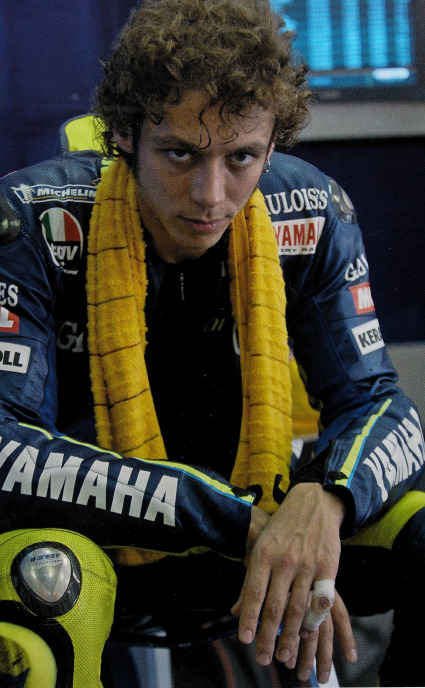
^his poor pinkie finger :(
sete must have felt on top of the world after qatar. he had clawed back 25 points. a championship that had already seemed lost suddenly felt like it might be in his grasp once again. valentino could complain and whine and be furious for italian television, but surely this is the kind of thing that blows over. for too long, sete is under the mistaken impression that they will move on from this. for too long in that presser, sete is playing at respectability while valentino has already progressed to open hostility. it's unnerving, of course it is, to suddenly be completely cold-shouldered and ignored by a man you had thought you were on reasonably good terms with a week ago. it's unnerving for it all to happen in front of cameras, when for so long you have been striving to present a cordial, friendly, civilised image of a rivalry. him and valentino don't do all that nasty business, not like valentino and biaggi. sete's better than that and valentino has grown up a bit - this is one of those ideal rivalries people are always going on about, the ones that are ferocious on-track but respectful and even warm off it. and so, despite everything valentino had said to the press over the past week, he still manages to completely blindside sete in the moment. he still manages to leave him unsettled, and even disoriented
and so we get to the race itself, pivotal for sete and his championship hopes. to still have a chance at clinching the title, he really needs to be fighting at the sharp end of all three of the remaining races. alas, it is not to be. valentino is reinvigorated after the humiliation of qatar and coasts through the weekend on a wave of irreverent indignation - telling reporters after qualifying on pole that this result had been important "especially since it means we know which part of the grid to clean tonight". he thrives in the chaos and the frenzied speculation and the seething tension - whereas sete is nowhere to be found all weekend. valentino wins with a comfortable margin while sete finishes a lowly seventh place. a healthy thirty point lead in the championship has been restored. now, then, in victory valentino has been provided with the opportunity to really twist in the knife. sete comes up alongside him on the cooldown lap, clearly wanting to shake hands - and valentino completely ignores him, does not as much as glance in his direction. then, he stops for one of those whimsical planned celebrations that he's ever so fond of, and he cleans his grid slot with a helpfully provided broom. as valentino says afterwards, "this time I wanted to destroy the morale of everybody". and if that wasn't enough, he adds in the post-race press conference "for me, sete did the best race of the season. he has given me a lot of points, which is like a big present. I am really grateful". charming as ever
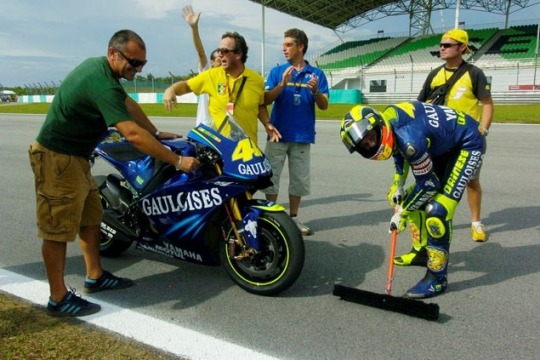
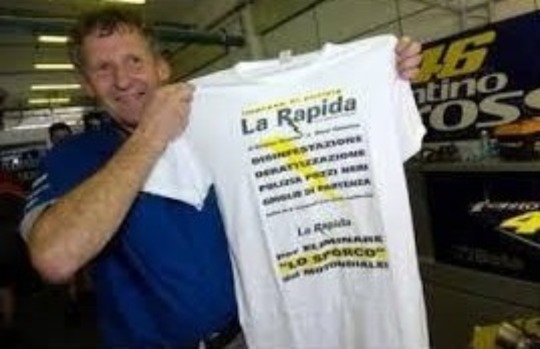
^he also came up with his own cleaning crew founded with his trusty crew chief jerry burgess, 'la rapida', and had shirts mocked up - to 'eliminate dirt from motogp'. so nice to have a supportive crew chief, isn't it? from valentino after the race: "I've been working with jeremy for four years, together we've seen all sorts of things and when I arrived here I saw him with an incredible face, disgusted, saddened. he and the team said we had to react and so we did". and as jb put it, "valentino is the sort of rider I wouldn't want to get angry. he can take you apart on the track". the text on the shirt: "we clear out rats. we disinfect, clear drains and clean starting grids. we also do night jobs - all done in six seconds [aka the qualifying penalty he'd received]"
two races to go, and it's match point rossi. he finishes first or second at phillip island and the championship is his for certain - if he doesn't do so and sete wins the race, it's hello title decider. there is barely any doubt left in people's minds, then, about who the 2004 champion will be... but it's not a done deal. in the very worst case scenario, valentino enters the final round with a slender six point advantage. he's not safe yet. he's not safe yet on the very first lap, which, it has to be said, is a lot of fun. vale gets a better start than sete does from pole, but sete overtakes him around the outside and vale is quickly pushed to third - then fourth, at which point he runs off track and makes a risky excursion into the dirt. at the very next corner, he makes a downhill overtake on two ducatis at once, and sets about hunting down sete who has built up an advantage of over a second
so, in fittingly dramatic fashion, the race comes down to a duel between the two of them, valentino stalking sete around the track lap after lap. if valentino holds his ground, the championship is his - but sete takes the win and can go into the next season with new confidence and self-belief and hope for something better. valentino does not just want to avenge the injustice of qatar; this is an investment for the future. a way of telling sete that he has not just lost this season but that he will always lose, when fighting valentino. there is a promise to be kept, after all - whether it was only supposed to apply to that season or not, valentino refuses to let sete win another race. they exchange overtakes but sete is still just about in the lead when they enter the final lap. it is here that valentino makes his move, not once but twice to make it stick. his riding in that last lap isn't egregiously reckless but certainly not risk-free, and could have ended with him in the gravel and the championship still undecided in valencia. but he's not and it isn't - and just like his first premier class title (a comparison valentino himself makes in his autobiography), his first title with yamaha is sealed on the last lap of phillip island. his championship-winning shirt is uncharacteristically stark, reading simply 'che spettacolo' ('what a spectacle/show') - and he's not wrong. this has been a show, it's been a miracle, and in the end it's been theatre. he's sealed the title in style while also getting his revenge. it's winning in the most satisfying manner you can win anything: by beating somebody you loathe. celebrations are nice, but isn't there just something special about seeing the person you despise look so wholly miserable?
sete puts on a brave face, determined to be above valentino's pettiness. he goes over, shakes valentino's hand. valentino accepts. of course he does - he's won. sete was a few corners away from denying valentino's curse before it had ever really sunk its claws in. would it have changed things, if he could simply have regained a little confidence and found his bearings again after the psychological onslaught of the sepang weekend? maybe, maybe not. of course, looking at valentino's 2005 season, you have to say valentino was almost certainly operating on a level no version of sete would have been able to match. but there's still a lot of room between 'fighting for a championship' and 'becoming a shell of the rider you once were' - and if things had gone a little differently, you do also have to say that a championship as open as 2006 was could have represented opportunity for all manner of rider. if only he'd been able to cauterise the wound in phillip island, rather than letting valentino dig his teeth in even further
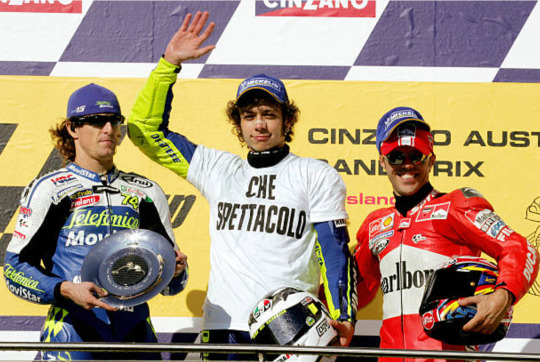
^at least capirossi's having a good time :D
the championship sealed and there's but one round to go. once again the paddock must regrettably visit a track that some critics have described as 'drab' and 'soulless' and 'the enemy of good racing', and one at which valentino has only won once before. but the way to tease out a special performance from valentino is generally to give him a point to prove, add in a little spite to get the fires spitting, and he wins at the circuit for the second (and last) time of his career. in front of the spanish fans too, which must have felt particularly satisfying - and the race itself isn't all too bad in the first half (the way valentino gets past gibernau/biaggi is quite funny). home hero sete takes fourth, and that's a wrap on the 2004 championship
there's something deceptively comfortable about the final numbers: 304 points to 257. 47 points. no problem. but sports isn't just numbers; it's the story those numbers tell. valentino was furious in qatar and he made a mistake and he ended up in a position where things don't have to go all that differently for him to lose the title. the momentum was on the side of his enemy, whose confidence and morale had been given a much-needed boost. the genius of the entire sepang weekend, from the press conference to his jibes in interviews to his dominance performance-wise to the cold shoulder to the pointed celebrations, was that they all worked together to stop that momentum cold
maybe it didn't make much of a difference - valentino was always in the stronger position given he both had a points advantage and was the faster man. but faster men have lost championships before. ignore raw pace and performance edge and all of that: valentino wrested control of the intangibles - momentum, self-belief, all of those abstract things that defy rational analysis - and brought them firmly back onto his side. sete spent the entire weekend off balance, unsettled, forced to discuss things that made him uncomfortable, engulfed in a media storm he was ill-suited to coping with. all the while, valentino relished it and used it to spur himself on. by the time sete had regrouped in phillip island and was far cooler - if still respectful - towards valentino, it was already too late
in the interest of eventually finishing this post, we're not going to cover sete's downfall in that much depth. but there is still one last critical blow that valentino has to inflict to truly bring an end to the gibernau experiment. the very first race of 2005 was one that valentino particularly wanted to win - not just to inform his competitors that this year would be more of the same, but also because they were once again on sete's home soil. time for jerez
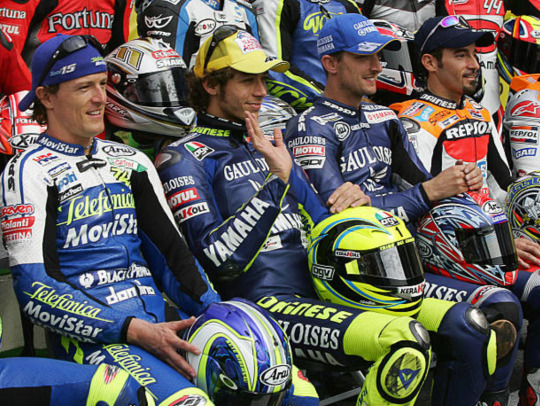
^new year, new sete! this time he's going to show that italian upstart what's what
as ever, the media had done its best to hype up this new season. sete would be getting full support from the factory (which, yes, feels like maybe they should have considered providing a touch earlier) and he made it clear he was ready for the challenges ahead, ready to get revenge and all that. the spanish had grown fonder of their unexpected challenger too, and showed up in full force to support their man in the opening race. of course, a lot of people quietly agreed that realistically speaking, the competitive picture was looking pretty ominous. 2004 should have been the season in which valentino got the yamaha project up and running, setting up a title challenge in 2005. but he was ahead of schedule and surely the yamaha would only get stronger. still, you never know, right? that's why we line up on sunday etc etc
valentino stole pole position from sete right at the end of qualifying, but crashed in warm-up and ended up using his second bike, which is never ideal. the start was already feisty from both parties, and for a while valentino was relegated back to third. but sooner rather than later, he assumed his familiar position sitting right on sete's rear tyre, showing sete his wheel here and there just to remind him where he was. remember the whole sachsenring debacle after which valentino told himself that he wasn't going to leave it that late again? well, he was actually nice and sensible here, and made a move with two laps to go, successfully passing sete for the lead
which should have been the end of it. nice and clinical, a lovely relatively stress-free culmination of a whole race's work where valentino had diligently studied his opponent's strengths and weaknesses and had formulated his plan accordingly. job done, another win on the board to start the season. except then valentino decided to make things interesting again on the very last lap by out-braking himself on the back straight and running it wide into turn 6, allowing sete back through. there's a slightly frenetic energy with which valentino immediately hops back onto sete's rear wheel, already a touch of desperation about his lunge on the inside of turn 11 where he briefly goes past - but he's in too hot and sete's back in front
what all this means is that valentino really only has one opportunity left at turn 13 and barely any time to conceive of it. there's no planning or calculation or strategy here. valentino has one option to attack if he wants to win this race. it's a dive that is instinctive rather than planned - the only calculation here is that he would rather crash them both out than let sete win the race. back then (and a bit ironic from a modern point of view), valentino's infamous dangled leg was seen as evidence that he was out of control, doing anything he could to get the bike stopped while going for a gap that wasn't really there to be gone for. they make contact, valentino manages to get the bike turned and sete goes off into the gravel, but can get the bike back on track to finish second. valentino does a wheelie over the line. sete makes a thumbs down gesture
the spanish fans decide pretty quickly whose side they're taking in this. there's booing, whistling as valentino completes his victory lap, going full ham as he pumps his fists and claps at them and does a thumbs up and waves and puts his hand on his hip and all the rest of it as they scream at him. parc fermé is tense, the eye of the storm in the midst of the deafening roars of the crowd, with sete giving vale a couple of long looks as he gets off the bike. it's all big drama, everyone consulting their teams, talks of appeals to race direction, valentino grimly satisfied while sete is aggrieved, furious - stretching out his arm, clutching it, shaking his head while shaking teammate melandri's hand. he approaches valentino, says a few words to him as he walks past - valentino is not particularly interested in engaging in conversation. the crowd demands valentino's disqualification, and also call him a son of a whore. they're also obviously still booing. and whistling. lots of noise
on their way to the podium, sete is making tortured progress, pausing for a moment in the stairwell to clutch at his arm. at this point, valentino takes a moment to take the piss out of his rival, turning to the camera with a big smile and gesturing at sete. eventually they make it to the podium and vale laps up the displeasure of the spanish crowd. valentino smirks while sete goes for a sort of pained dignity, thanking the spanish crowd for their support, claiming the moral victory and all that. the italian anthem is almost inaudible
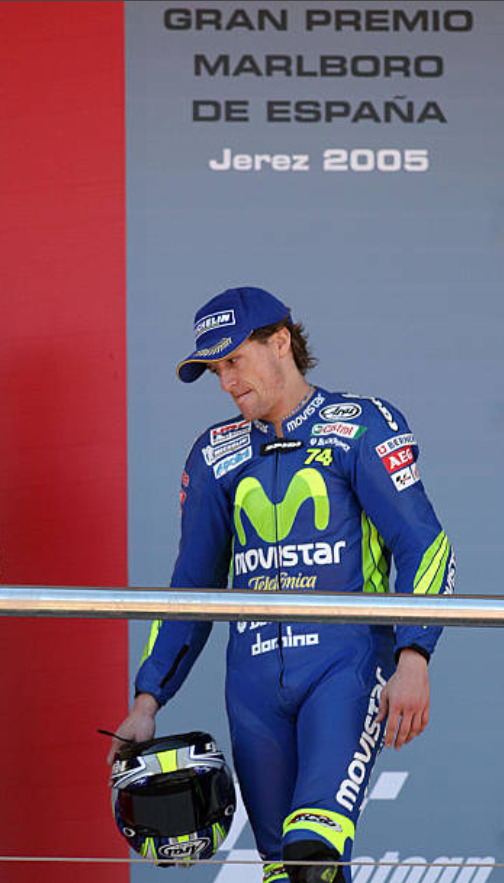
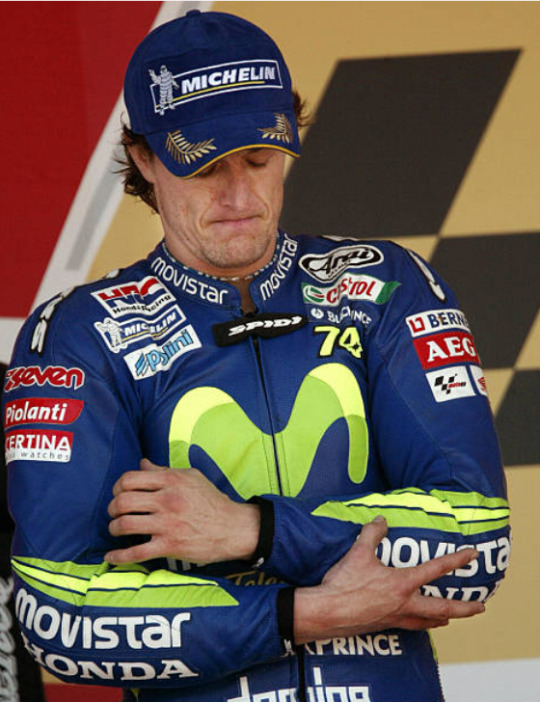
^sete always tried to go for a kind of stoically disapproving vibe, helped along this time by his pain in the shoulder. unfortunately for him, he does just come across as thoroughly defeated. which he was
the problem that sete faces here is that, while valentino is obviously more accustomed to a rather friendlier reception, it's also not like he particularly minds the spaniards giving him a hard time. valentino has claimed his fourth victory in succession, and has done so by once again denying sete on the very last lap. he has sent a message that this new season will be exactly the same as the last and that he remains exactly as determined to make sete's life miserable. while he does seem to think sete is playing up the shoulder injury, in general sete's solemn grimaces are like catnip to him. just before the anthem, he reaches out to shake first melandri's hand and then sete's - and sete hesitates, before extending his arm to the fullest extent to shake valentino's hand with about as little proximity as is physically possible. it's good sportsmanship, but it does also as good as tell valentino he's not going to kick up too big a fuss. in a way, whatever choice he made would have played into valentino's hands. even though this time sete may have directly confronted valentino, he's still not prepared to escalate things beyond that... and valentino knows it
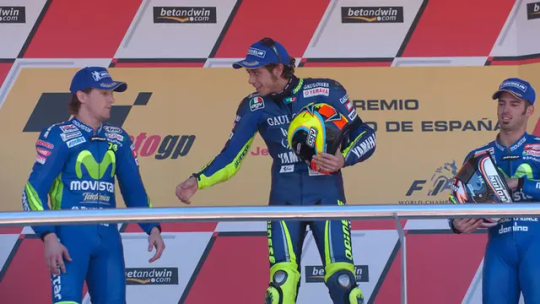
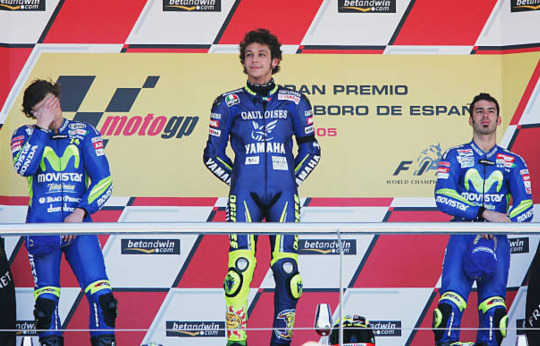
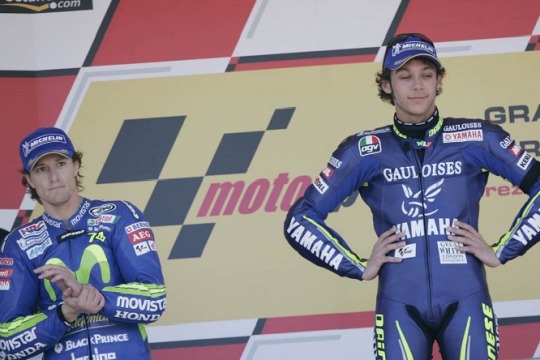
^one of the classic rancid vibes podiums. the hands on hips at the ceaseless spanish booing is a nice touch
this choice to avoid further escalation is one sete continues to abide by in the press conference, echoing the assen presser from the year before beat for beat. again, valentino comments that it was a great battle, that sete is surely angry but, essentially, it is what it is ("this is the racing"). again, sete congratulates valentino for the win, but refrains from complaining about valentino's actions during the race. he has since said that he talked to race direction about it and was incredibly disillusioned about their choice not to penalise valentino - but again, not a whisper of it to the media with valentino sitting next to him
the one thing he did say was that he hoped he'd be fit to race in estoril because of his shoulder. remember the whole clutching at his arm routine where valentino (and the commentators) were kinda taking the mickey out of sete's comically pained expressions? well, um, turns out he did have a lot of pre-existing shoulder problems, and indeed that was the bit of his body that caused him considerable problems for the rest of his motogp career:
Gibernau dislocated his collarbone when he crashed out of the lead of the 2002 Portuguese Grand Prix on a Suzuki GSV-R, suffered a left shoulder tendon injury during his last turn clash with Valentino Rossi at Jerez 2005, then damaged the same shoulder further when he fell in practice for the following Estoril round. At the 2006 Catalan Grand Prix, Gibernau broke his left collarbone after spectacularly tangling with Ducati team-mate Loris Capirossi at the start of the race. Gibernau required a further operation shortly after when the titanium plate inserted to help his collarbone heal was found to have weakened. The new plate was in turn damaged when Gibernau hit Casey Stoner's fallen Honda in the penultimate round of the season, again at Estoril, marking the end of Gibernau's factory Ducati - and, it seemed - MotoGP career. Before making his 2009 MotoGP comeback, Gibernau had the metal plate removed from his collarbone, only to suffer shoulder ligament damage during training - forcing him to miss the final pre-season test.
well, anyway, after the controversy has had two weeks to continue on full steam, valentino does strike a somewhat more contrite note in the estoril pre-event press conference. he says he hadn't been aware of the whole shoulder situation and that sete had been unlucky given it had been a light touch in a slow corner... but having rewatched the footage he can see how, yes, maybe the contact could have hurt sete. these things happen, right? and at the end of the day, it doesn't really matter for valentino, because the controversy blows over. what remains is the blow (psychological rather than physical) he dealt sete. what remains is that he won and sete lost, again, and sete has still failed to win since qatar
"And I really think that as long as he wins this race, even if he only takes five points back off Valentino Rossi, he will be happy with that, because it's all about getting back to winning ways. He hasn't won since Qatar last October. He's got to take a victory, just to get his season back on course. Valentino Rossi is going to take a lot of stopping, and really all he can do is try and win this race in front of his home crowd." [...] "That race in Qatar, and the problems they had in that race with Valentino Rossi crashing out after having to start from the back of the grid was really when all the problems started, didn't it, for Sete Gibernau. [...] But really that's where his problems started, both on and off the track for Sete Gibernau after that race victory in Qatar. I really can't believe he would've believed that was going to happen. He was so, so pleased to win that race." [...] "This is a big big thirteen laps for Sete Gibernau, isn't it. If he can hold off Valentino Rossi, psychologically, it would be a very very big victory for him."
^excerpts from the catalunya 2005 commentary, the sixth round of the season. valentino had said in the presser after the preceding race that he expected biaggi and melandri to be his main rivals that season. sete leads for almost the entire race before valentino makes his race-winning overtake with three laps to go and smashes the previous circuit record on that lap
what remains is one failure after another. an important thing to stress when we talk about a 'curse' is that sete gibernau did not suddenly stop being a frontrunner after qatar 2004. he qualified on pole five times in 2005 (same as valentino, funnily enough - his average grid position was actually better than vale's, 2.82 v 4.12). even so, things go from bad to worse for sete. often valentino does his own dirty work in stopping sete when he's getting a bit too close to that elusive victory, winning a close duel in catalunya, pressuring sete into a mistake at the sachsenring, that kind of thing. often, he does not even have to. sometimes he took himself out, like crashing out of the lead in the wet conditions he was once so very skilled at in estoril (not helping his injured shoulder) or in donington park, where valentino went on to deliver perhaps the finest wet weather performance of his career to take the win
"I don't think anyone can be to blame for crashing out in these conditions, can they. [...] It really is at that stage of the season for Sete Gibernau where it's all or nothing, really just got to try and win races. We're now twelve races since his last victory at Qatar. Valentino Rossi promised after that race that Gibernau would never win another race and well it seems to be coming true so far."
^excerpt from the donington park 2005 commentary, the ninth race of the season, where sete crashed out of the lead in horrendous wet conditions
valentino's favoured way of winning races played into his hands here. pressure, pressure, pressure - preferably exerted from right behind his victim, with the knowledge that valentino is waiting and studying and ready to pounce on any mistake. even if you don't make any, he'll probably get you anyway. the effect of these defeats becomes nicely cumulative, where even the knowledge that valentino will be coming (even if he isn't there yet), that eventually he will try and pass you (even if he hasn't done so yet), is enough to make his opponents self-destruct before he even has to lift a finger. what he does to sete is the most extreme version of how that tactic typically works, by slowly eating away at sete's confidence and composure and self-belief until the eventual error feels increasingly inevitable. valentino knows it is coming, sete knows it is coming, and they both play their parts accordingly
"But Rossi straight after Gibernau, now he'll start those pressure games. Pressure is on Sete Gibernau. He has not won a race for a year; the last race win was here. And the man he doesn't speak to, he doesn't speak back to him either, Valentino Rossi, behind him, and Rossi will start exerting the pressure Rossi-style as we know." [...] "A year ago, wasn't it, it doesn't seem that long ago, doesn't it, that Sete Gibernau was so delighted to win the race here. And Valentino Rossi really left in a strop, didn't he. But there we are, Sete Gibernau - but we've seen it before, and Rossi seems so have this ability to faze him, out at the front, put pressure on him." [...] "Well, Nick, you said at the start of this race that Valentino Rossi has plenty of motivation to win this race here. He wants to take ten wins for Yamaha, it would be the first Yamaha rider ever to do that in the premier class. He wants to end a drought almost in his terms, certainly since he became a Yamaha rider - he's never gone three races without winning a race before, but that could happen today if Gibernau holds this out. And of course the one thing he really wants to stop is Sete Gibernau from winning a race one year on from the day that Rossi said he would never win another one for the rest of his career." "How long does a g-'s curse take, I mean, is it just a year, the g-'s curse and then does it come off? Because if it is then he's just about right, isn't he? [...] Perhaps the curse is gone; perhaps this is just what Sete Gibernau needed."
^excerpts from the qatar 2005 commentary, the fourteenth round of the season. sete looked like he was making a break for it ahead of valentino and then melandri. six laps to go melandri almost causes valentino to crash and costs valentino over a second, but it doesn't matter. this time it's melandri who has the honours of coaxing a mistake out of sete, who goes off into the gravel as melandri passes him. valentino overtakes melandri for the victory
sometimes, he did just seem cursed in the truest sense of the word. his bike running out of fuel on the last lap while he's still fighting valentino for the victory. mechanical dnf's. other riders barging him out of the way before valentino even has the chance to. he switched manufacturers for 2006, getting a spot on the ducati factory team: his last race with honda was ended by an engine failure and his first race with ducati was ended by an electronics failure. a freak boot protector malfunction that left his foot bleeding halfway through the race. a nasty crash in catalunya, followed by his ambulance crashing into a bus fifty metres in front of the hospital entrance. in the end, it was probably the injury caused by casey stoner bringing him down in estoril that pushed him definitively into retiring - after he was dropped by ducati in favour of casey. so it goes
obviously, valentino cannot be held responsible for anything in that last paragraph. you can't mind game your opponent into having their engine blow up, at least I don't think you can. the stuff before that is fair game. what valentino did in jerez essentially stopped the title fight before it could even get started. it was ruthlessly effective in removing sete as a significant player at the top of the sport. sure, it's always hard to attribute a competitive decline such as this one to any single factor. but if ever there was a time to maybe just blame one person...
sete more often than not has kept his silence about the rivalry. in 2005, he generally did not go much further than saying that the whole thing was one-sided and started by valentino, see this (from one of oxley's books):
But don't ask me about him as a person, I'll only speak about him from a professional point of view, that's about it. I don't know why he's got a problem with me because I've never had a problem with him. I've always had a lot of respect for everyone on the grid, I just wish everyone shared that respect, because once you lose respect you lose everything.
on a similar topic, at some point he has also spoken about the qatar controversy again, saying the following:
He blamed me but it was nothing I did. Of course I didn't report him - I didn't even see what happened. I'd had a very good relationship with Valentino for many years but after that it just came around.
in 2009, at the time of sete's ultimately short-lived motogp comeback, he went along with the slight farce of a reconciliation, shaking valentino's hand and talking to him with cameras watching - the season after valentino had regained his crown in '08. but it is fair to say not all is forgotten. at times, he has done his best to draw a line under jerez and continues to refrain from criticising valentino publicly, like this from 2017:
The Catalan avoids criticizing the Italian for any controversial maneuver, such as that of Jerez 2005. "At the time I was living, based on my values, principles and education, I tried to do things as well as I knew how. And I am very proud of what I did ." Sete explains what it means to battle Vale. "We did very nice things fighting against a phenomenon, he may be the best in the history of motorcycling. I am proud to have fought face to face with a guy who is a phenomenon," he explains.
(obviously, you can read this as valentino not following whatever values, principles or education he might have possessed.) at other times, he's been a little more openly critical. in 2020, he still did not criticise valentino as much as he did the response to the overtake, which he felt set a bad precedent and has contributed to the normalisation of a more aggressive style of racing in the years since:
I don't know how many times we've talked about that corner, but the more time goes by the more I understand after that, things change. Many people were seeing that move, and from that moment on it opened the door for it to happen many more times. At the end of the race, both of us did what we thought was best for the championship, and my opinion can be whatever. But since then things have changed in MotoGP and racing is understood, which I don't agree [with].
he also adds this:
When asked if race direction would have looked into that incident had it happened today, Gibernau responded: "To tell you the truth, no. I don't think so. "I've got different thoughts on that side, which are mine, and like I said I don't need to be right or wrong. Everyone has his own thoughts, and if I put myself now in a situation where I was watching a race and I saw what happened there [at Jerez] where two guys risking their own lives touched each other in a difficult last corner, and I was looking at it with my son who would like to become a road racer, and everyone would give the victory to a guy that has touched another one, I wouldn't be wanting that to happen. "I don't want anyone to get hurt. It's one of my priorities and it's how I understand sport and racing. MotoGP is already so dangerous that in my opinion we should all put together our know how to avoid these type of situations. Is it difficult to do? Yes. Is it impossible to do? I don't think so. It's responsibility to whoever is in charge of the championship and to put the rules where we need to stay away from this type of situation because, like I say, we're risking more than just a crash."
and even more recently, in 2023, he's spoken about the jerez race being the source of his disillusionment:
If I'm telling the truth, Jerez 2005 made me lose my enthusiasm for being in the races. I tried to maintain it until the beginning of 2006, with Ducati, and when we could have won, a mechanic left a gear screw unadjusted and the gear lever fell off. That day, in Jerez 2005, I mentally retired. Valentino went inside and took me out. They didn't penalize him. It's my personal opinion, everyone will have their own opinion and it must be respected, but I think that this is not a contact sport.
also in 2023, in a separate interview, he said this:
But he didn't get a punishment or anything, and then I started to lose my faith in the sport. [...] I couldn't understand how, y'know this was not a contact sport, I couldn't understand... things happen in the championship and things had been going on inside and everything and I just lost my - started to lose my illusion in the racing.
which is later in the same interview followed by this (which is partly about his woes in 2006 - he also talked about the moment with the gear screw, but I think pinpoints that rather than jerez as the day he mentally retired):
I had done such a big effort to put myself to a position to where, I was fighting against my own demons, I was fighting against the championship, I thought no one's helping here. I was fighting against one of the top guys in the history of racing, which was Valentino, and I just thought, but, Valentino doesn't even need to do what he's doing to win, and no one is saying nothing. There was many things there and I just couldn't understand... I'm fighting against everything, you know, and I was expecting the championship to just be a little more neutral on that side, just to say, if someone does something wrong you've got to say, in my opinion, it's not a contact sport; it's already dangerous enough to being able to say you can hit someone and say, wow, that was a great move. [...] Everyone is brave on a MotoGP bike. Moto3, Moto2, MotoGP, from the first guy to the last guy, you cannot pinpoint on TV and say how brave this guy was by hitting another guy. Because if I'm a dad watching that I would not want my son to be in a championship like this. Because it's not bravery, it's not about hitting another guy - if you want to do that, go boxing. [...] And from a guy like Valentino, which is, a superstar, why accept that? I think it was wrong, in my opinion, he didn't need to do that. Since then, many things have been happening because of that movement. Because kids saw that and said that's the way to do it. And then Marquez is doing it to this guy, and the other guy is doing it to the other guy, and you get killed in racing. It's already dangerous. We should stay away from that. That's why I never understood - it got to a point where I just - oh man. It's nothing to do with me here any more, you know, and I just left racing and I retired.
for the most part, then, sete is still quite contained in his criticisms of valentino, focusing on the jerez incident and not really delving into what happened the year prior to that. he mainly questions why valentino even felt the need to do what he did to sete, and suggests valentino set a bad example to others - especially kids watching, especially future riders. his criticisms also concern motogp as a sport, those who set the rules and those who regulate them, in not doing anything to stamp down on this kind of racing. he says he felt like he lacked support from the entirety of the sport and eventually decided that he'd had enough
I haven't added this block of text just because I enjoy transcribing large portions of three hour long podcast interviews that didn't really need to be three hours long (apparently the most tried and tested method of getting riders to share their more candid thoughts about anything) - but because this, uh, average-length tumblr post wouldn't really feel complete without it. it's all very well and good to talk about how sete was mentally 'broken' by what valentino did to him. you can have whatever opinion you want about the thoughts sete expresses here on riding standards and acceptable levels of aggression. you can also maybe doubt whether it really was just 'disillusionment' with race direction's approach to valentino's jerez pass that caused his competitive decline - obviously, three hour confessional podcast interview or not, this is a narrative he's still chosen for a reason and it sells himself and his career in a certain way. but - but - especially given the exact circumstances in which his rise to title challenger status occurred and how heavily he involved himself in the safety commission... well, at the very least I'm not going to leave it out. should he have made his complaints publicly known at the time, if this is something he felt so strongly about? is this level of criticism warranted by that specific jerez move? it's tough, because from the modern perspective of course I too have gotten used to a kind of racing where that level of contact is fairly normalised - which two riders this century have played a disproportionate role in bringing about. on the one hand, valentino is right in his defence that relatively speaking, this is far from the fastest or hardest contact out there. on the other hand, it's a move that was made with the knowledge it would result in contact. and in doing so, he injured sete, because that's what can happen even as a result of relatively 'light' touches. make up your own mind! it's not an easy topic to address, and I most certainly wouldn't be able to do it justice here. let's wrap this up
of delusion and despair
valentino has always been intensely aware of the power of narratives and takes care in how he tells his own story. the most literal version in which anyone can tell their own story is, obviously, by publishing an autobiography - which he did in 2005, covering everything up until his first title with yamaha at the end of 2004. it is not presented in chronological order and is instead organised in a far more loose thematic manner, with valentino not feeling any compulsion to give all parts of his life anywhere close to equal attention. still, when you read it, certain omissions do jump out at you - and the exclusion of gibernau is perhaps the most remarkable. you could say it's because he doesn't want to speak ill of his rivals, but he has no problem going into a fair bit of detail about his feud with biaggi. you could say it's because the gibernau rivalry was still going on at time of writing, but the same is more or less true about biaggi who placed third in the 2004 championship. there is not a single paragraph in his autobiography devoted to the relationship with gibernau. every mention of him is just that: a mention. a name thrown in without care when discussing something else entirely. you are told vale passed gibernau to win the 2004 championship - but if you read the autobiography without any other knowledge of valentino, you'd be forgiven for not realising gibernau had been his title rival at all
yes, within the grand context of his career, biaggi does have to be seen as a more significant rival... but this narrative was still being written in late 2004, at a time in which valentino had committed himself to destroying sete. maybe valentino doesn't want to comment on controversies that are still bubbling along, but the sheer extent of the erasure feels far more deliberate than that. this is somebody who had been valentino's friend for years, enough so that they spent time with each other outside of work, went on holidays together, blokes who for all intents and purposes truly liked each other's company. somebody who had been his closest rival for two years, who had pushed him closer than anyone else had in his title runs, who he had experienced some of his greatest career defeats and victories against. according to the narrative presented by the autobiography, he might as well be just any other rider. it's worse than fury, worse than loathing: it's disinterest
(it has to be said, quite possibly the funniest omission is when he's talking about how "angry and disappointed" he was after qatar because of, and I quote, "honda having lodged an appeal". ... anyone else you thought was involved, valentino? .....?)
which is quite the punishment to enact. one reason why this rivalry is so tricky to analyse is, yes, it's one that's quite old by now, but also because we are drawing from a far smaller sample size of valentino comments - almost all of which were provided at the time - when you compare it to any of his other major rivalries. sure, he still talks about jerez 2005, when he's asked about it - though it might as well just have been another fun race, another dramatic victory, another controversial overtake, rather than anything that had any greater significance. (of course, there is also a clip of him forgetting about the race entirely when thinking about last corner overtakes in the premier class with sete in the room - which you can read into if you so choose.) he's talked plenty over the years about his first yamaha title in 2004, but not about the man he beat to secure it. this was his closest title battle of the ones he won (just pipping 2009), but he might as well have won it against a faceless amalgamation of the honda corporation rather than an actual living breathing rival. it's as if that title battle started and ended in welkom, where it was biaggi not gibernau who valentino had to best. even though publicly the two of them set aside their feud in 2009 and valentino even said then that they could be friends again, this feels like lip service more than anything else. in 2015 at jerez, valentino was questioned about the parallels to his relationship with a certain other rival, who was friendly with valentino at the time but had crashed out while battling vale in the previous race. valentino in response acknowledged his past good friendship with sete, but said it was different: after qatar his relationship with sete had gotten worse as a result of how sete had "played a dirty game". if he had not changed his mind about sete's character eleven years after the fact, why would he have reevaluated in the years since?
it is fair to say that gibernau was the least talented of valentino's major rivals, the least substantial figure in terms of his accomplishments in grand prix racing. biaggi is a four time 250cc champion; nobody needs to be reminded of the achievements of stoner, lorenzo or marquez. sete is the rival who wasn't even supposed to exist; he was catapulted into the position essentially overnight by tragedy. and yet, even acknowledging that, it feels like he is under-discussed in the canon of valentino feuds given the sheer quality of their on-track output (let's face it, there are more great vale/sete battles than there are for say vale/casey) and the high drama of their closest title fight. yes, you can say that's because it is one of the older and less well-remembered rivalries, because it is not quite as dramatic and significant as the biaggi feud... but still, it's quite the disparity. given the power valentino holds in writing the stories within the sport, how can you not conclude that he has played a helping hand in this erasure? being ignored is a far greater indignity than being despised - and after 2004 valentino has barely even offered sete the honour of his hatred
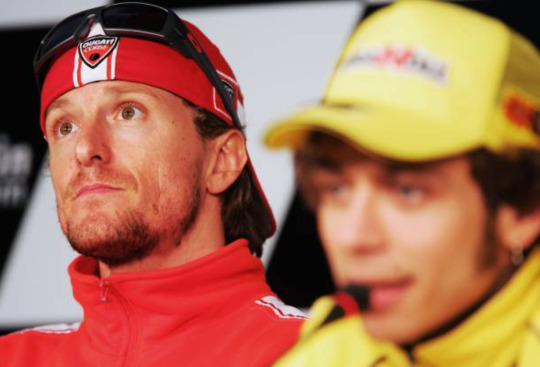
^sete tried to breathe new life into his motogp career by switching to ducati, but his campaign was derailed by injuries. it was probably scant consolation in his miserable 2006 season, but valentino himself was pretty cursed that year. their last on-track battle came at phillip island, in the series' first bike swap race while valentino was fighting tooth and nail to save his doomed title defence. it's admittedly one of like twenty things that happen in that race, but it is quite funny how sete really came back to life just in time to make valentino's life harder when he really didn't need him to. valentino overtook sete on the final corner of the race for the final podium spot
of course, it is a hell of a lot easier to erase a rivalry when you win it so conclusively. in truth, as an opponent, valentino got the measure of sete fairly quickly. he never lost another direct duel against sete after sachsenring 2003, having essentially vowed as much to himself even when they were nominally still on good terms. the 2004 championship was as close as it was because of valentino's unequivocally inferior machinery and the somewhat less consistent results he achieved as a consequence - but even there, when they fought directly for the win in mugello, catalunya, assen and phillip island, each time valentino came out on top. (you can argue about brno '04 - I'd say it doesn't really count since sete ended up running away with the race with a massive tyre advantage.) still, you don't have to be winning all your direct duels with your opponents to be winning the championship - and at the end of the day, sete did come tantalisingly close to a title, or at the very least forcing a title decider. whatever it is that differentiates 'very good riders' from 'champions' is what sete is lacking. he has something in him... a self consciousness, a self awareness even, that is lethal to professional athletes. he was stuck trying to manage the image of his rivalry with valentino, when valentino was moving in for the kill. valentino too is heavily aware of image, is heavily invested in how he tells his own story - but more often than not, he manages to use it as a weapon to spur himself onwards to further success. when valentino did so once again in late 2004, sete stumbled
it is not novel to suggest that valentino needs enemies to motivate himself. plenty of people within the sport have said it, including his fellow riders. that's what's always worth remembering about the 'mind games' - sure, it's great if he unnerves his opponents, but often it is about providing himself with someone to hate though there are exceptions to this, which I have a lot of thoughts about relating to one casey stoner. valentino needs to have a reason to do what he does; it's not enough to win for the sake of winning if there's no story. in 2003, he had more or less won motogp and was finding it harder and harder to motivate himself, admitting repeatedly that he was losing his joy and passion for racing. yes, this was one of the main factors that led to the move to yamaha: to give himself a reason to keep going. but it was also just the right moment for another rival to emerge from nowhere and give valentino somebody new to focus his attentions on. when you read the limited autobiography mentions of sete and his interactions with valentino in 2003, it seems hard not to conclude valentino was already feeling a little less kindly towards sete by the end of that year. the relationship did not survive contact with a true title fight, where valentino found himself pushed closer to the limit than he ever had before. the moment he was in real danger, he blew up the relationship and walked away with literal full points for the remainder of the season. at the very next race to start off the new season, he made sure sete would never be a threat to him again
it's natural to conclude from all of this that the feud was built entirely on the back of valentino's delusions, of valentino inventing a concrete reason to despise sete that was based on his mental list of sete's past transgressions, imagined or otherwise. and maybe it was. did sete really snitch? did valentino really think he did? what was it that convinced valentino of sete's guilt? and even if sete was involved, was this really a proportionate response? this is where a lack of evidence and both parties' reticence to discuss the incident in the years since works against us. but - looking beyond the specifics of what happened in qatar, it does feel likely that the relationship would have deteriorated beyond what we saw in assen anyway. that's what a close title fight tends to do to the people involved. isn't it?
sete makes for a suitable foil to valentino because he too intensely concerns himself with how he is perceived. when vale takes on sete, one pretty boy to another, they are both a little too aware of the artifice of what they are doing, a little too concerned with the optics, the image, the spectacle. rivals, friends, enemies - how far apart are any of those things, really? can we be friends if you desperately covet what I have? if you take pleasure at the thought of my downfall? is this oft-touted ideal of a 'respectful' rivalry inevitably nothing but a facade for the ugly reality that lies beneath? 2004 is what happens when their relationship is actually tested - because now they are finally fighting for something real and they both know it. this is what happens in assen, when valentino decides he needs to win at any cost, when sete realises they are not playing the game by the same rules. sete had been performing graciousness and valentino calls him on his bluff
the best rivalries transform both parties; neither side should be allowed to emerge unchanged from the battle they share. sete entered valentino's life as a competitor at a time when everything was a little too easy and as a result a little too hard for valentino. at a time when valentino felt dissatisfied, underappreciated, judged harshly from all sides and pinned down by the weight of the world's glares. the blows sete inflicted on valentino were primarily symbolic, hurting valentino's pride and reputation rather than his title bid in 2003, which was never under any realistic threat. when valentino was at his lowest that season, he responded by bringing the joy back, reverting to type, with a new haircut and an ironic gag of a celebration and a daring victory to boot. in 2004, however, valentino changed. he had to - he was on a worse bike than his opponents that he was wrestling towards a title it had no right to be winning that year. he didn't have the kind of margin for error any more that he could afford in his honda years, no more foolishness like at the sachsenring. so he became a little tougher and a little meaner and a lot more aggressive in his racing. he shed some of the insouciance that both him and sete have at times been accused of and got down to the serious business of winning. not joylessly - after all there are few things more enjoyable than crushing the enemy. still, it's fine to be a clown prince in your downtime, not when you're barging title rivals aside in assen
it is here, then, at assen, that sete makes a critical, fatal mistake. because sete is torn in two: he wants to be the gracious rival, but he also thinks what valentino did is wrong and wants to communicate as much to the world. maybe it's because it clashes with sete's understanding of racing, maybe it's simply because sete is bitter that he lost - who's to say. except sete can't bring himself to actually say any of this. he chooses the worst possible strategy against valentino: silent disapproval and annoyance and frustration, played up for the television cameras, but without offering a single word of actual complaint until later, when valentino had already offered his explanations and half-apologies. so what valentino takes away from this is twofold. for one, he comes to believe that sete has a problem with his racing and cannot graciously accept his defeat, entirely failing to match valentino's magnanimity on the (rare) occasions when he loses. but unfortunately for sete, what valentino also learns is that - when it comes down to it - sete will not stand up for himself. valentino knows he can do this again
in sepang sete attempts to take the high ground once more, to allow valentino his transgressions and foibles and temper, to be calm in the face of vale's fury, to be the better man. in australia sete pulls himself together to shake hands with valentino, to be respectful of his rival's accomplishments and graceful in defeat, to be the better man. in jerez sete is beyond angry, furious enough to actually approach valentino in parc fermé and say a few words to him, but he still shakes valentino's hand on the podium and refuses to complain directly about him in the press conference - because he is determined to be the better man. does he think he can shame valentino into being different from what he is? if so, it is an unfortunate miscalculation. you cannot claim a moral victory against somebody who does not give a shit
for valentino, at least half the joy of racing has always been about beating the opposition. a new rival is presented to him out of nowhere - and out of him valentino fashions himself an enemy. sete was one of the first people to offer valentino advice when vale entered the premier class, but this was not the last thing valentino learned from him. because what valentino did to gibernau was different than what he did to biaggi. this was not just trying to get a rise out of a bloke he disliked every time he got half a chance. this was not valentino slowly chipping away at his victim's patience and self-control and sanity. what valentino does to gibernau is far more sudden and far more targeted and gets a far more immediate effect. he emerges from qatar weakened and on the back foot and within eight days flips the situation so that he is once again the one in command. sete, who had very much exerted himself in presenting the relationship in a certain way to the world, who wanted so badly for this to be a certain kind of rivalry, ever so respectful - well, valentino found out just where to hurt him. he did it with his sudden public coldness towards sete, with carefully chosen remarks to the press to make clear that nothing had been forgiven, with the jibes and the taunts at each and every stage of his victory. he married the off-track theatre with on-track strategy as well as pure performance, directly disrupting and disturbing sete whenever necessary - the kind of combination he would later find so useful in fending off first casey then lorenzo. it's no coincidence that his three most famous career overtakes are ones that are also so significant in how they affected valentino's fortunes in the aftermath of his victory. laguna 2008 and catalunya 2009 represent complete shifts in momentum within their respective seasons that his rivals never quite recovered from. jerez 2005 ends the title battle at the very first race. and it's not just sete's season that didn't recover - it's his career
of course, it's easier to mess with someone when you have the measure of them in performance. that's always something to keep in mind when talking about mental resilience: it's easier to bounce back from your rival being an asshole to you if you're just really, really good at what you do. valentino always understood himself that any 'mind games' had to be backed up by on-track performance; he's openly stated that all of his off-track "work" on his opponents only gets results if it's paired with being strong on the bike. and he himself lost his cool in qatar - but it helped that he knew he had what it took to bounce back. this was never a rivalry of equals; there was never any question between the two of them who the better rider was. all that being said: it's a really good rivalry! guys, there's some really great races. sete was a serious challenger and he did pose a serious threat to valentino, which you can tell because otherwise valentino never would have needed to do any of this. he made valentino grow as a rider and... do you make someone 'grow as a person' if you make them better at psychological warfare? yes, I think so. actually
valentino became a more accomplished rider for having experienced the sachsenring debacle, and he became a more accomplished rider as a result of the qatar fiasco. he motivated himself to become better because he wanted to defeat sete so badly, and isn't there something compelling about that? valentino was willing to take risks at phillip island that could have resulted in a title decider, was willing to make himself extremely unpopular with the spanish crowd at jerez (not something he has typically had much experience with) - all because he needed to crush sete, to destroy him so completely he could erase him entirely. at the end of the day, there's a bunch of reasons why this rivalry doesn't get the attention it deserve. one of them, however, is that valentino seems to be pretty happy with this state of affairs, and has spent the better part of two decades deeply disinterested in paying sete his dues. don't let him have his way
#sete gibernau#brr brr#//#sg15#sete ask yay#right I'm aware this is a topic nobody else actually cares about That Much but I had fun and that's what matters#you'd never believe this but there's quite a lot of this I ended up cutting. like I do have More Thoughts I fear#I don't love this as a piece of writing and it runs into some major tonal issues at some stages but well! post like nobody's reading etc#I feel like every time I try and add a read more it fucks the formatting of the pictures but I'm gonna trust it's. Fine#batsplat responds#curse tag#essay tag
77 notes
·
View notes
Text

Moon 17 (Part 3)
#blood#animal death#skuaclan#moonskip events#clangen ocs#eveningstar#bluefeather#sunstar#oakdawn#shellsnap#oops i called him sandfoot on the last page's tags. it doesnt matter. get renamed idiot youre dead#bluepaw#bluekit#ravenpelt#ravenpaw#ravenkit#doveclan#formatting of this accidentally looks like ravenpelt is horrified by sunstar swearing LMFAO that's unintentional#format is intentionally chaotic btw i know it doesnt flow the best
83 notes
·
View notes
Text
Just an asura ask game
1. Do they fit well into asuran society or are they more at home with other races? How do they feel about fellow asura? Is it because of their personality or something else? Is there any deal maker or breaker?
2. Where were they born? Did they like the place? Did they grow up there or did they move away at some point? Do they wish things went differently?
3. What's their family like? Are they still around? Do they like them and get along? Are there any expectations coming from them?
4. How is their social life? Are they generally well liked or despised? Are they involved in any drama? Do they make more enemies or friends? Do they have any meaningful friendship or bond?
5. What's their approach to romance? Do/did they have any partner? Are they more interested in relationships with a predetermined end date or are they looking for a stable long-term relationship? Is the option of having/adopting progeny on the table?
6. Do/did they have any non-sapient companions, like a pet or a golem? If not, would they want one?
7. Do they prefer to work alone or with others? Do others like working with them? Are they competitive or do they prefer that others take the spotlight? How would they fare in the opposite situation?
8. Do/did they have a krewe? If yes, describe them, their roles and tasks. If not, why?
9. What are their hobbies and pastimes? Do they have any natural talent or particularly strong interest that's not tied to their job? If nothing in particular, what do they do with their free time?
10. Is there anything they're terrible at and shouldn't be trusted with? Just how bad are they at it? Why? Has it resulted in any serious damage?
11. What was their education like? Did they go to Splorg's Metamystics Labs or somewhere else for their early education? Did anyone mentor them or take them for an apprenticeship/internship? Did they get admitted into one of the Colleges? If not, what path did they take and why?
12. If given the chance, would they take the position of professor in one of the Colleges? Or would they prefer to become someone's mentor? What would they teach? Would they be a good teacher?
13. What's their field of research of choice? Are they're pursuing it or is something else taking priority? If they don't have one or more, why not?
14. Do they consider themselves intelligent by asuran standards? Can they call themselves a genius? Is it an opinion shared by others or do they just have a big ego?
15. What's their job? Are they good at it? Are they happy with it or do they wish for a different one? Did they change careers at any point?
16. What's their greatest achievement? Was it an invention, a discovery or something else? Did they get any recognition for it? Was it part of their goals or is there something else they're aiming for?
17. Have they ever earned a title or honorific? Do they like it? Are they aiming for a specific/different one?
18. Can they use magic? If yes, do they use it for anything practical in their job? If not, does it bother them?
19. What do they usually wear? Is there any particular quirk to their outfit of choice? Does it show their status or is it merely practical?
20. Has any experiment (or experience) blown up in their face? Did they learn anything from it? Would they try again?
21. Have they ever been experimented on or personally taken part in an experiment? Was it willingly or not? What do they think about it?
22. Have they ever done something awful/unethical, be it in their personal or professional life? Do they regret it or at least recognize it as such? Does it still affect them in any way?
23. Given the history between their races, what do they think of skritt? Are they still a threat or is there a chance of cooperation?
24. Do they have any particular opinion on the Peacemakers and the Arcane Council (and Eye)? Do they have any direct experience with them?
25. Are they (or anyone they know) part of the Inquest? How do they feel about the infamous megakrewe?
26. How much does the Eternal Alchemy matter to them? Is it something they want to understand or do they not care at all?
27. Have they been impacted by that whole Pact thing? What do they think of the First Pact Commander, Aurene and the whole Elder Dragon mess?
28. How do they feel about Cantha and their technology? Is it interesting or an affront to asuran genius?
29. Do they have any interest in returning to the Depths of Tyria? Do they think asura should go back to their lost cities in the Depths to rediscover lost knowledge, or should they be fine with life on the surface?
30. Free space for 3 pieces of trivia about your asura!
#gw2#gw2 asura#asura#gw2 ocs#ask games#ask meme#my ask games#guild wars 2#I'm quite vibing with this format of “main question + extra questions to expand on the topic”#this one was much longer but I tried to keep it to “strictly asuran” matters. got more games ready for the other races!#note: I will end asks all to those with easy to find character lists/tags. or at least try (tagging the reblog helps as well)#as for my characters: all asura in the list + Alyt (Tocchix's “aunt”) + Quazz (Tocchix's father) + Huki (Tocchix's current partner)#+ Veeq (Lenorey's gf) + Nuvly (Bunnie's qpp and Flom's gf)
42 notes
·
View notes
Text
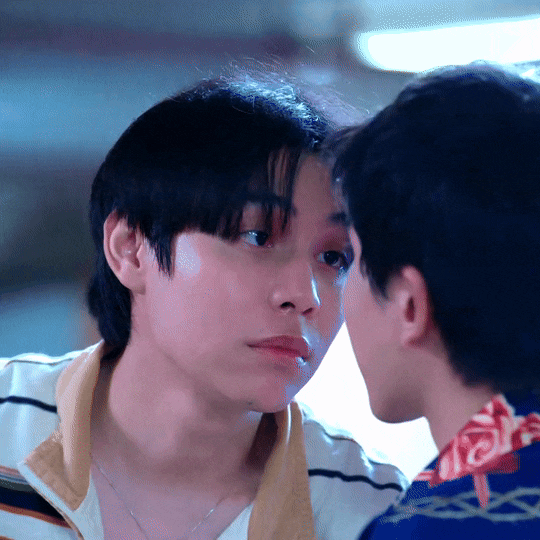



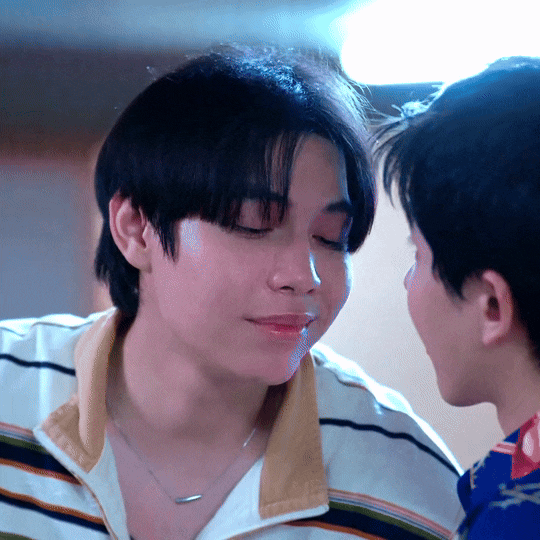
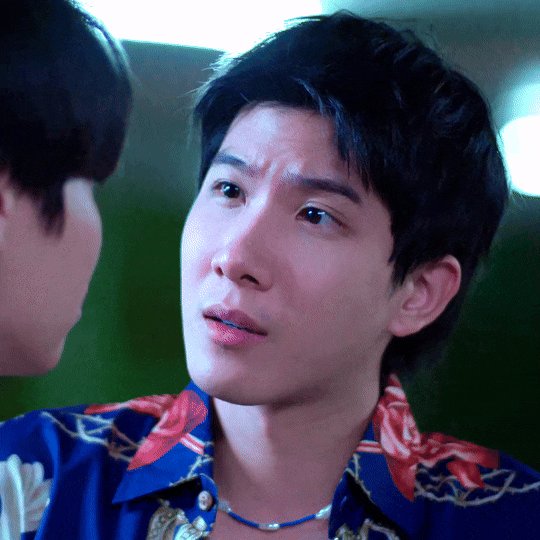


▸ “But what's the... occasion?” ▹ “...Nothing in particular.”
#nof's nonsense#saw someone mention this scene in the tags of another set and i went back to watch it and like. yeah. bison's face got me again#the expressions are rly interesting#thk#thaiql#nofedits#nofedits.thk#gifset#i think my gifs have been a little crunchier for this ep bc i used a different download video format#compressing stuff more to maybe make it look less obvious but shrug. it doesnt bother me very much and thats all that matters to me lol#bison thk#kant pattanawat#the heart killers#never sure how to make the lighting better given its not good in the first place so this is the best i got
17 notes
·
View notes
Text
just one step at a time (Asmodeus x GN! Reader drabble)
Content warnings: physical self harm alluded to but not described. very very slight yandere.
Word count: 769

Asmo looked up from his phone as he heard his bedroom door creak slightly, taking his hand off his chin as he shifted his weight to rest evenly on both elbows. His beloved human stood in the doorway, frowning and not quite meeting his eyes. They swayed slightly on their feet.
"Darling?" Asmo asked after a moment of silence. The human didn't reply, eyes wandering around his room as they grimaced slightly.
"Why don't you come in? Come sit by me, please." Asmo beckoned them over, his tone gentle yet commanding as he moved to sit up against the headboard of his bed.
The human nodded, taking a few quick deep breaths before moving. They closed the door behind them after a long moment and disjointedly moved over to Asmo's bed. Asmo noticed they winced slightly as they shifted their weight to their thigh to get both legs on the bed. His eyes widened slightly in understanding, but he said nothing about it.
"Can I hold you, dear?" Asmo asked, placing his phone to the side. His human nodded.
The demon gently maneuvered their body to rest their head on his chest while pushing them to lay on their side, facing him. He watched as the human's eyes drifted around his room, looking around but not seeing. They certainly weren't asleep, but weren't present either.
Asmo kissed their forehead, leaving a slight mark from his lipstick. His manicured nails followed, mindlessly drifting to scratch against their scalp and cup their cheeks as he nuzzled against the top of their head. The same hand then drifted down to rest against their arm. He rubbed his thumb against it gently, calmly.
The demon closed his eyes as they stayed like this for a few minutes, breathing in the scent of the shampoo he had gifted them a few weeks ago. He felt the human's heart rate slow down as they laid there, until it was calm and steady again.
"Asmo..." The exchange student started talking quietly. "I remembered you said I could see you when I wanted... I just saw you were livestreaming before and didn't want to bother, so..." They trailed off, grimacing as they tried to explain their behavior.
"So you just tried to take care of things yourself?" Asmo questioned gently. The human nodded, tilting their head to bury it further against his chest, almost trying to hide themselves.
"I can't even go two months without... you know..." They sighed, feeling like they were going to cry, but knowing they were too emotionally exhausted to do so. “I just don’t know any other way of helping myself, I… I just don’t know…” They trailed off.
"Darling... you don't need to try so hard to fix everything yourself." The demon mumbled as he rested his cheek against their head, before pulling back slightly to speak more clearly.
"I know your... methods work for you, but they make you feel so bad afterward, too. That’s why you should let me help more. I can end a few livestreams early now and then, there will always be more." He smiled at the human, then continued.
“My fans don’t mean anything compared to you, kitten. I love my fans, but I’d sacrifice all of them if it meant I could keep you consistently content.” He felt them let out a slight laugh at that. He giggled in return at the sound.
“Mmm, you’re so cute. Don’t think of it as a joke though.” His grip on their arm tightened slightly. “Would killing off a few random fans help to show my devotion to you? To help you feel better about coming to see me?” He continued. The human shifted slightly to finally look up at him and gauge his facial expression. He blinked himself out of his slight stupor as he felt them move, then moved his eyes back down to meet theirs, his face splitting into a gentle grin.
“Sorry, hun, I’m getting off-topic. My bloodlust can be hard to control, hehe.” He giggled again, and put a hand on their head.
"But I’m really so proud of you for coming over to see me, honey. I know it's hard to get used to, but you did so well." He started, petting their head as he spoke.
"Maybe we won't break your... habits of emotional regulation right away, but we can in time. Just keep being good for me like this, darling. We can take one step at a time together.”
The exchange student nodded, sighing.
“Just one step at a time.” They mumbled as they sank back into Asmo’s embrace.
#i wrote this very quickly i haven't written anything in this format in a while! very strange but it's nice#asmodeus x reader#asmo x reader#obey me asmo x reader#obey me asmodeus x reader#obey me x reader#obey me#spaceii's writing#autistic reader#i like to tag it bc it's my perspective so it's important to define for me for extra context... idk bahaha does not matter too much but sti
36 notes
·
View notes
Text
What is Whole, Exactly?
Part 1 - Calamity
Disclaimer: This series of posts are meant to be my own personal interpretation of the album! I'm just one person, and the beauty of this album is that there's so many interpretations. I don't want to come off like I'm stating facts about the story here- it's all my personal thoughts, you're free to have your own!
that said, let's get into it!
Time Machine Reprise
(Soul)
Oh, live the dream in a time machine I've been waiting forever But I can't seem to find my footing back on one What's the time? Where's it gone? When's beat one?
This is the very first mention of Whole, or at least the concept of Whole. Here, “one” refers both to Whole and the first beat of the song. This sets up the idea that Whole is the end goal of this loop (whether it be a literal or metaphorical loop), and that the splitting of Whole is what causes this loop to continue. Soul has been waiting forever for the harmony to last, but he can't find his footing (i.e. ending the cycle). This segues into the next song nicely.
Dream
(Soul)
There’s still another sunset to be found inside this tangent, so I will try again. And perhaps when we become whole, it’ll hold.
Soul’s determination here defines this song. The first half of this song is chaotic and frantic, the middle half bitter and mournful. Here though, he finds his resolve. He knows that being Whole isn’t permanent, implying Soul knows something about the loop. This is further supported by the fact he says he “can’t go another round of cacophony.” It puts a lot more weight into his words: He knows that this is pointless. He knows that it won’t hold. Whole is an unattainable goal that Soul knows won’t last. But he still tries. This devotion in the face of futility is what defines his character.
Perhaps we’ll meet at Tycho, or somewhere more solar, yet colder. This world’s hard to shoulder. But when Harmonia shines, Atlas beholds her, so bathed in serenity; beauty, in synchronicity; blissfully entwined. Divine. So I will try one more time...
This is the reference most people think of when they think of Whole. Obviously, Atlas refers to Soul in this metaphor. People think of Atlas as holding up the earth, but he actually holds up the sky. He keeps the sky from crushing the world below. Now, what characters are represented as the sun and moon, the two main things you see when you look at the sky? This metaphor is even evoked in this very segment: Tycho is a crater on the moon, and the “solar, yet colder” is a clear reference to Mind, who’s directly referred to as cold despite being the sun. Soul holds up Heart and Mind, keeping them from crushing Whole—his world, the thing that he’s shouldering this burden for despite knowing it’s fruitless.
Now, Harmonia. Harmonia is the goddess of concord and harmony. In fact, she's also called Concordia—which could be the inspiration for Concord as a name. It's unclear here whether Harmonia represents Whole in this line, or she's the abstract concept of being Whole. Either way, Atlas seeing Harmonia is Soul clinging to the image of Whole as a beautiful, serene, divine thing. The perfection of Harmonia is what keeps him going. Becoming Whole is also referred to as “harmonizing” several times in the album, furthering the connection that being Whole is seen as a harmonious and beautiful thing.
{I had an entire paragraph interpreting the mythos around Harmonia before realizing it's probably not that deep, but I digress.}
My point is, our first descriptions of Whole come entirely through Soul and his determination to make it through Cacophony again. It's not until Cacophony that we hear Heart and Mind's thoughts on what Whole means. Next time... we hear those! I was originally going to make this all one big post, but I'm already at 2k words and I haven't even finished my analysis of Cacophony yet. So... no, we aren't doing that.
...I have no idea how to end this post. Ok bye
#cccc#chonnys charming chaos compendium#chonny jash#cccc analysis#cj soul#cccc soul#cj whole#cccc whole#i'm sure some people will say they want the full post no matter how long it is but trust me#it would be a nightmare for me to format all of that at once. it's self care lol#tridential tirade#the abrupt ending is kept for comedic value because it's 11 pm and i don't feel like using my essay skills to gracefully conclude#this one might be the shortest analysis i think? we'll see how concord goes#i limited myself to only actual references because if i got into every single metaphor i'd just be doing a full album review#and i have a job so i don't have time for that#uhhh thanks for reading my tags. whole&soul warriors stay strong i guess
12 notes
·
View notes
Text


I think everyone should applaud me for doing my part as a white girl to serve a single shred of biodiversity to the ecosystem of orange county by not getting a rhinoplasty
#now i have to record notes down into digital format for my potential new job#i am not excited but i will persevere#or maybe ill fall asleep. ill set my alarm for 4 am just in case#its crazy how no matter how hard i try my face always looks like this when i take a selfie. its crazy#she is simply not thinking look at her#thats a lie but these are the only ones where the colors dont make me look like i dipped my hair in a tarpit#i can waste hours typing inane things in the tags but i think im officially done correcting colors on selfies
35 notes
·
View notes
Text
my dear @mckaylahoopers tagged to do the "pick 4 characters you love and let people vote which one most like you" thingie (thank you, it's such a fun thing to do!!) so here are mine :3




no pressure tags: @cruelfeast @darthteeth @nocylipcowa @officialkendallroy @whoevenknowsdude @lwieserce @lostintheparsec @destructions-daughter @anastasiasvixens and everyone who wants to do this!!
#hi it's me was bpdamandayoung but my love for that song is so overwhelming i had to go back to pastempomat :)#i had trouble with finding photos i like so that's why it's formated like that i realized it's not that serious#Daenerys means strictly book Dany she still holds a special place in my heart and the tv show doesn't matter#oh and if i tagged you and you already did this thing i'm sorry i didn't know#also sorry it took me so long however last few weeks were a lot rip#gadanie żaby
7 notes
·
View notes
Text
oh no. i'm writing the introduction to fantasy au lmao fuck
#gonna be going back and forth btwn dah and pbr until pbr is over and then i'll decide if i'm gonna post dah#like. i would try a WILDLY different format than anything i've done in the past#all one fic. unknown amount of chapters. each chapter is a singular scene. each scene is under 5k at the Most.#like this one i've almost finished is less than 2k. and the lake scene was less than 2k. i can see some getting longer but not by much.#i'd love to try writing something with limited pov to hide things from the audience#and i'd love to try writing a bit more Matter Of Factly and concise#so idk. maybe i WILL do it! hm!#r.txt#dah tag
13 notes
·
View notes
Text
that one post the other day asked about Lavellan's family members and reminded me that I had concepts of rewriting the 'Protect Clan Lavellan' war table missions as an actual playable quest, especially one in my world where my companion OC Enasel'an Lavellan is involved
Anyway i've since written 6 pages of notes on how the quest would work and how Enasel'an specifically as a companion ties into it
#went through and wrote down all the info we have from the war table mission descriptions about what actually happens in Wycome#now does all of it actually make sense? eh#more so than some parts of DA less so than others lol#BUT the point is that it actually translates to a playable quest. remarkably well imo#so now I have basically a whole quest#plus notes on my OC and how they fit in#and I think I might need to work on companion banters and such for this quest#now i will say i do not have the FAINTEST idea how mods work but i do wish I could just import my brain matter into this game lol#bc now i wanna do this lmao#this is all also background information for the mavren lavellan retellilng i'm doing (bc it's my canon and I make the rules now)#that I'm writing instead of. actually writing said mavren lavellan retelling#oops lol#anyway if you've made it this far in the tags hello go drink water and also send me a message if you want to read about it LOL#if i can get this into an actual shareable format i might just. share it#but for now it's bullet points (paragraphs long bullet points but I digress) in a google doc lol#dragon age inquisition#protect clan lavellan#enasel'an lavellan#my post
3 notes
·
View notes